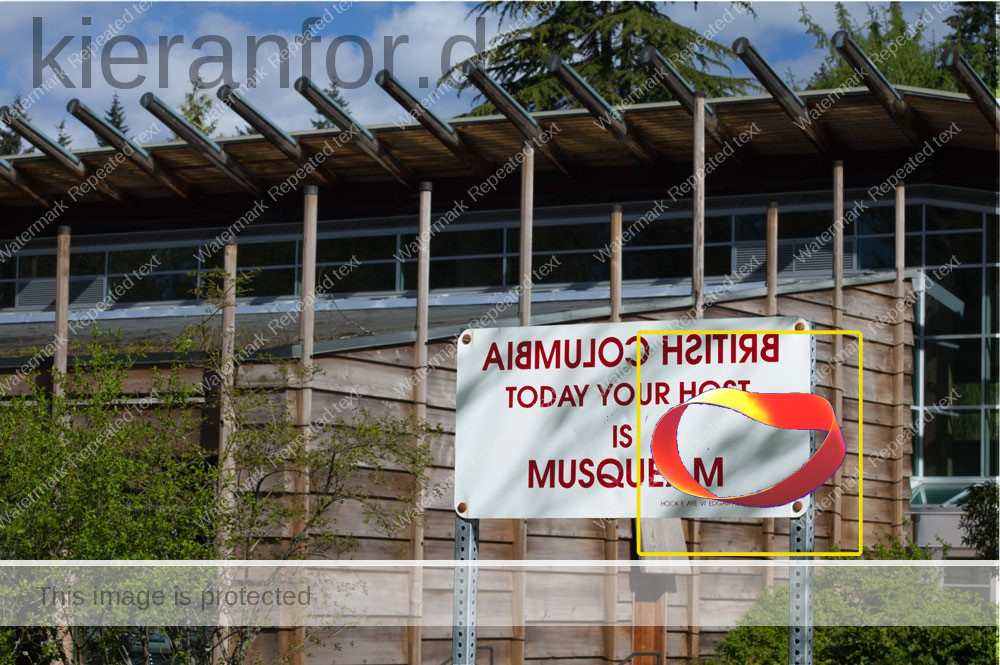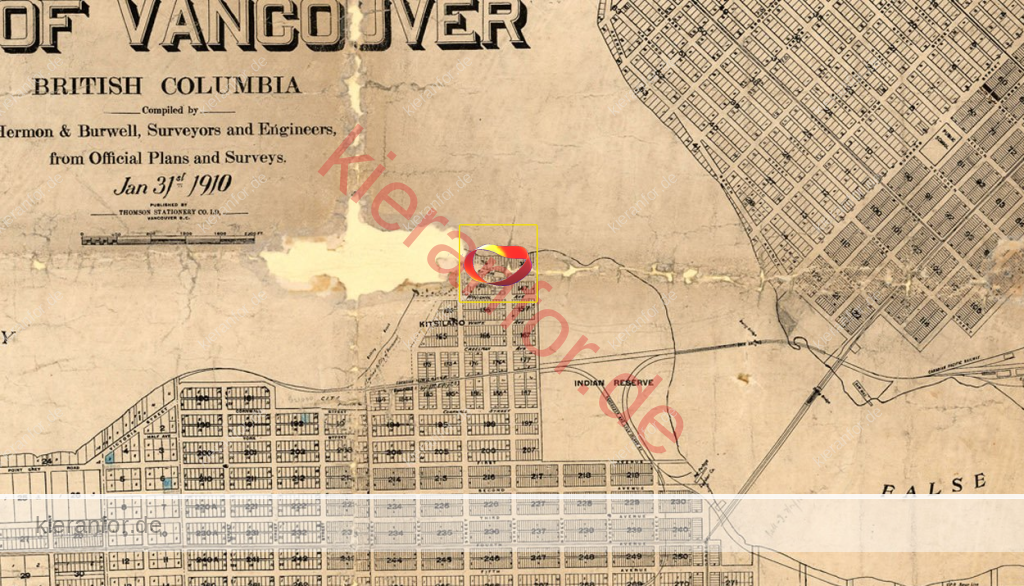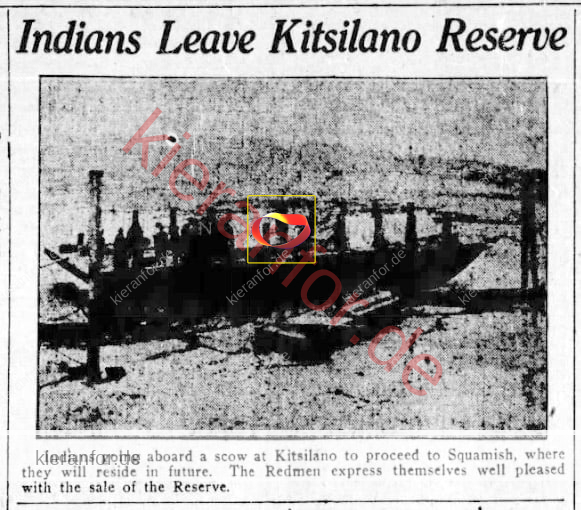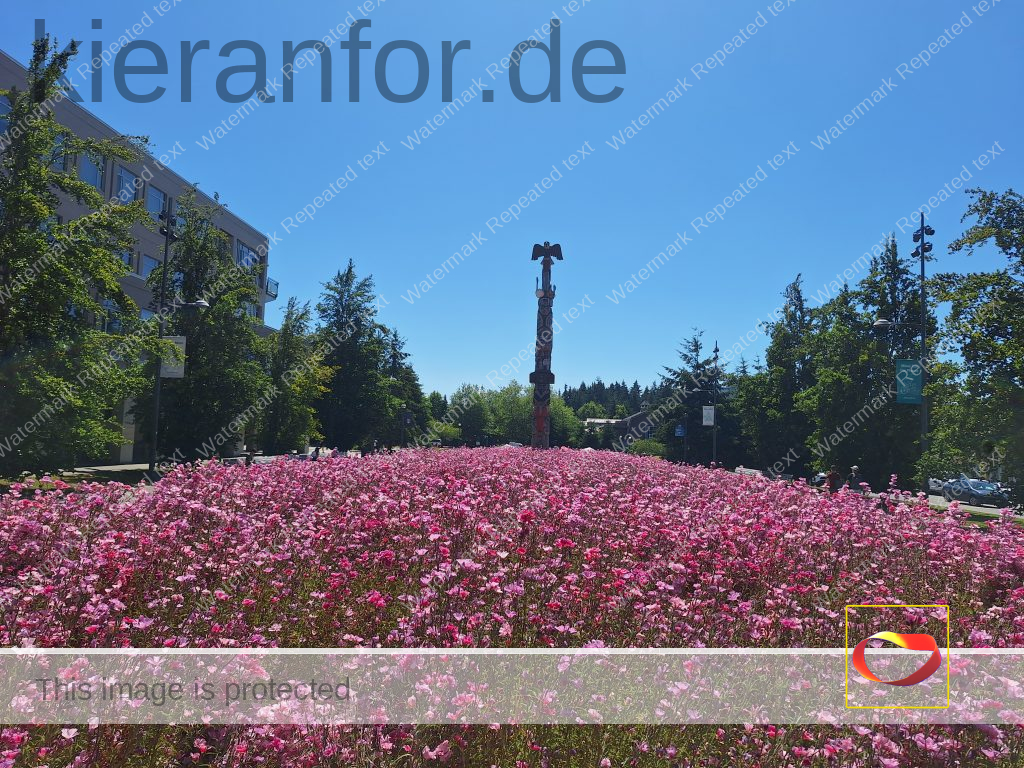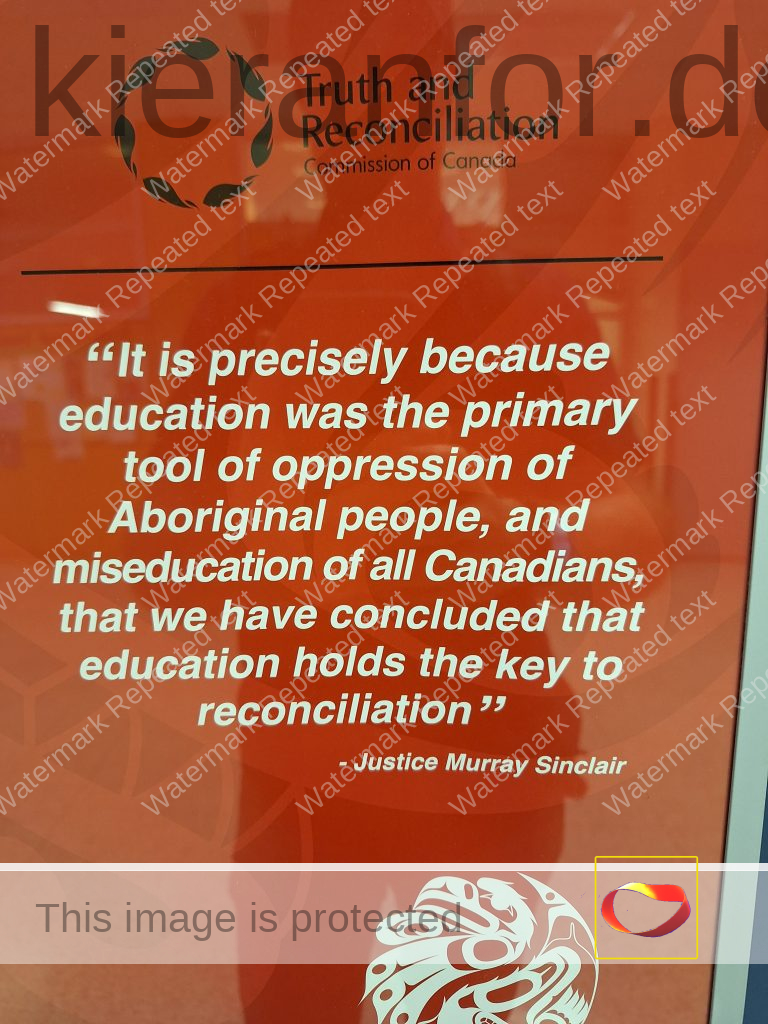Header image: One of 12 signs from the Native Hosts collection by Edgar Heap of Birds – Photo: Michael R. Barrick
Page name, from: Musqueam 101 https://www.musqueam.bc.ca/our-story/educational-resources/musqueam-101/
See also: Lynda Gray’s First Nations 101
This page is where I keep some of my notes on the learning I am doing around where I am, here in Vancouver, and who I am in relation to the Indigenous people of these lands.
To do:
- R. v. Twoyoungmen [below]
- James Teit https://en.wikipedia.org/wiki/James_Teit
- Department of Human Resources (Re), 2021 NUIPC 14 (CanLII) https://www.canlii.org/en/nu/nuipc/doc/2021/2021nuipc14/2021nuipc14.html
Jan 27, 2026
The reading in my morning Al-Anon group from Hope for Today reminded me of this well-known piece by Richard Wagamese
“All that we are is story. From the moment we are born to the time we continue on our spirit journey, we are involved in the creation of the story of our time here. It is what we arrive with. It is all we leave behind. We are not the things we accumulate. We are not the things we deem important. We are story. All of us. What comes to matter then is the creation of the best possible story we can while we’re here; you, me, us, together. When we can do that and we take the time to share those stories with each other, we get bigger inside, we see each other, we recognize our kinship – we change the world, one story at a time…”
In turn, I am reminded of a quote from Huebner that I will find and post here later.
Archibald, J. (2008). Indigenous storywork: Educating the heart, mind, body, and spirit (1st ed.). UBC Press.
“The dilemma of practising a cultural rule that could result in the loss of important cultural knowledge was brought up by Roy Point in relation to not divulging “secret” and sacred knowledge:
Some of the things I said weren’t supposed to be brought out at all. The old people used to say,“when you see something like that, (like what I told), you’re not supposed to tell anyone.” How are we going to learn our history, now that it’s getting lost, without telling it? We are taught to not let go of any of our own teachings and our own ways, medicines, our own teachings of each tribe, our own secrets. That’s the way it was. Now that [knowledge] is being lost. How to keep it alive is a really big question, because so many of our older people are gone, just a handful of us left … I don’t know how we can keep it alive. (Transcript, 28 January 1993).
- ﻼF connected with Mlieczko about this. How it might relate to non TE teachers teaching TE, “to keep the lights on”. Also, connection to FPPL “Learning involves recognizing that some knowledge is sacred and only shared with permission and/or in certain situations“
- LINK to Archibald SFU PhD
The Cromwellian Conquest: The Down Survey of Ireland
https://downsurvey.tchpc.tcd.ie/history.html
- In October 1641, the native Irish in Ulster rose in rebellion in response to decades of widespread dispossession and dislocation, as well as systematic religious discrimination.
- In March 1649, Westminster appointed Oliver Cromwell to lead an invasion of Ireland in order to crush all resistance to the new English Commonwealth and to avenge the alleged massacres of Protestant settlers in 1641-2. Irish land was also a valuable commodity, almost 70% of which was still held by Catholic landowners.
- Between 1650 and 1652 Ireland suffered a demographic disaster with up to 25% of the population dying as a result of deliberately induced famine, which also encouraged the spread of diseases such as dysentery and the plague.
By 1653, when the last formal surrenders of the war took place, the country had been devastated, the population decimated, the economic infrastructure destroyed. The English had effectively created a blank slate in Ireland onto which they now sought to project a new plantation society.
- By the middle of the eighteenth century the amount of land in Catholic ownership had declined to as little as 3% of the total. The land settlement of the 1650s, therefore, effectively established the Protestant Ascendancy class, which dominated social, economic and political life in Ireland for over 200 years until the great land reforms of the second half of the nineteenth century.
1949: Dr. Frank Calder – First Indigenous Person is Elected to the Legislative Assembly
https://www.leg.bc.ca/learn/discover-your-legislature/1949-first-indigenous-person-elected-to-the-legislative-assembly

First Nations Principles of Learning [9 mins]
- School District 27 Residential Schools and Reconciliation: Dr. Martin Brokenleg
- Reclaiming youth at risk… {ﻼF: Kenneth Edzerza}
- your mind has to be educated if you’re going to live well in Canadian society…if you don’t have Grade 12 your life is going to be diminished…
- Our ancestors were skilled at teaching the heart…[comes from] certain experiences
- feeling significant, capable, powerful on the inside, genuinely good human being
- Belonging should be a theme in school but when a teenager is in crisis, how do they respond?
- UnBelonging; Time Out, Zero Tolerance, Suspension
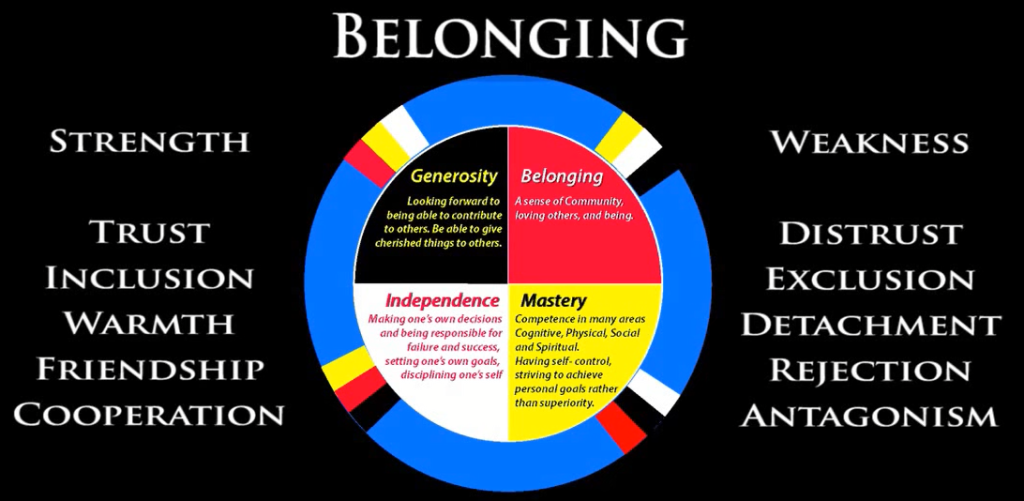
- 05:07 welding; 05:36 drill press, auto, excavator, foods
- A system of empowerment (not of control); typical of Aboriginal childcare
- Opportunities for generosity; Potlatch
- There has to be too much food
- Real generosity hurts
In this materialistic, fast-paced culture, many children have broken circles, and the fault line usually starts with damaged relationships. Having no bonds to significant adults, they chase counterfeit belongings through gangs, cults, and promiscuous relationships. Some are so alienated that they have abandoned the pursuit of human attachment. Guarded, lonely, and distrustful, they live in despair or strike out in rage. Families, schools, and youth organizations are being challenged to form new “tribes” for all of our children so there will be no “psychological orphans.”
~ Martin Brokenleg
(15 Nov, 2025) Opinion {Pete McMartin}: How long must I live in Canada before I am no longer a colonist or settler?
https://vancouversun.com/opinion/columnists/opinion-how-long-must-i-live-in-canada-before-i-am-no-longer-a-colonist-or-settler
- My family has been here for 214 years. It may not be “since time immemorial” but in time’s ledger it must count for something — either that or time, including even that of the immemorial kind, should have nothing to do with one’s claim to Canada.
- So in that sense, in the sense of our mutual histories and our going forward together into the future, I have to ask: Where is my rightful home, if not here? How long must I live here before I am no longer a colonist or settler, but native?
RESPONSE: Robert Jago: https://substack.com/@rjjago/note/c-178637610
- The only reason we need a term for them, is because there’s a term for us (Natives). We’re put in a box and given an ID that has the word ‘Indian’ written on it.
I think what people like McMartin don’t like is being labelled. Because it’s never happened to them before – they’re the default, and by being the default they never need to think about who they are as part of a collective. They can dwell on their own personal histories as a curiosity, but don’t need to think about where they fit. Us? We’re identified and labelled from the day we’re born.
Nov 21, 2025
I finally managed to connect with Zaa Joseph at BCIT on Tuesday. Alex M shared the video above with me and reminded me that I’d been meaning to follow up on the QR code on the House Pole that Splash [Google] carved:
Splash: https://housepost.commons.bcit.ca/artist.shtml
House post: https://housepost.commons.bcit.ca/background.shtml
R. v. Twoyoungmen, 1998 ABPC 135 (CanLII), https://canlii.ca/t/5r8k (Justice Reilly)
- [7] I find the latter item to be of special importance because the witness is Aboriginal, a member of the Stoney First Nations from the Reserve at Morley.
- [8] In all matters involving Aboriginal people, it is my view that judges and lawyers should always be mindful of the unique difficulties that they have with the justice system. As the people who were here before European settlement, the European based justice system to which they are subject is foreign to them and based on concepts which they, in their traditional culture, do not share.
- [11] Rupert Ross quotes this paragraph from a justice proposal by the Sandy Lake First Nation in both of his books, Dancing with a Ghost (p.168) and Returning to the Teachings ( p.5)
- Probably one of the most serious gaps in the system is the different perception of wrongdoing and how to best treat it. In the non-Indian community committing a crime seems to mean that the individual is a bad person and therefore must be punished….The Indian communities view a wrongdoing as a misbehaviour which requires teaching or an illness which requires healing.
- [12] The Cawsey Report {Internal Server Error} refers to the lack of respect for Aboriginal world view. In this regard there are two concepts which I believe to be of utmost importance in understanding the different thought processes from which traditional Aboriginal people and Euro-centric people approach the concept of justice.
- [13] The first is the position on human beings in the order of creation. Rupert Ross sets out this difference in Returning to the Teachings (p. 61)
- In Judaeo-Christian tradition God created man and …”God said, Let us make man in our image and likeness to rule the fish in the sea, the birds of the heaven, the cattle, all wild animals on earth, and all reptiles that crawl upon the earth…’
- It (Aboriginal tradition) places the Mother Earth (and her life blood the waters) in first place, for without them there would be no plant, animal or human life. The plant world stands second, for without it there would be no animal or human life. The animal is third. Last, and clearly least important within this unique hierarchy, come humans. Nothing whatever depends on our survival.
- [14] I believe this differing view to be the root of the hierarchical thinking of the Euro-centric people. The traditional Aboriginal does not share this thinking. In their tradition they did not give the authority to decide matters to people such as judges, they had a truly egalitarian society in which they acted by consensus and wrongdoing was dealt with by the community as a whole. Sense of community is still strong and for them to come into a room where strangers will pry into their personal affairs and decide what the consequences will be, is impersonal, bewildering and confusing.
MORE
Cowichan Title Decision
(October 16, 2025) BC Supreme Court’s recent Cowichan Decision
https://www.bdplaw.com/insights/bc-supreme-courts-recent-cowichan-decision
On August 7, 2025, the British Columbia Supreme Court (the Court) released the landmark decision, Cowichan Tribes v Canada (Attorney General) (Cowichan). The plaintiffs (the Cowichan Tribes) brought forward a claim for Aboriginal title to their traditional lands, the Lands of Tl’uqtinus (the Claim Area), and a claim to exercise their Aboriginal right to fish the south arm of the Fraser River. The defendants included the federal Crown, the Province of British Columbia (the Province), the City of Richmond (Richmond), the Vancouver Fraser Port Authority (VFPA), and two BC First Nations.
- The decision has attracted considerable media attention, largely due to the Court’s declaration that certain grants of fee simple title in BC are “defective and invalid”.
- The Cowichan decision is the product of a 513-day trial, including hearings spanning over 11 years – making it the longest trial in Canadian history.
- The decision marks a pivotal moment in the Aboriginal law landscape. Specifically, the decision advances the understanding and recognition of Aboriginal title under section 35(1) of the Constitution Act, and, if upheld on appeal, will set a profound legal precedent for future cases to be brought by other Indigenous peoples to apply to grants of fee simple land interests.
- requires plaintiffs to demonstrate both sufficient occupation and exclusive use of the lands during the relevant time periods.
- [The ruling] held that the Province lacked the authority to extinguish the Cowichan Tribes’ Aboriginal title through Crown grants of fee simple land, and that such grants did not legally displace or eliminate the Aboriginal title.
- The Cowichan decision is fundamentally premised on the unceded status of the lands at issue.
- In contrast, substantially all of Alberta is subject to historical treaties
╬
(Oct 21, 2025) Khelsilem: Setting the Record Straight on the Cowichan Title Decision
https://khelsilem.substack.com/p/setting-the-record-straight-on-the
Indigenous rights never caused the real “uncertainty” in British Columbia — it was created by the Crown’s failure to honour them.
- The judgment — which recognizes Aboriginal title over a small part of Richmond — has been widely distorted by political leaders, commentators, and municipalities who have portrayed it as a threat to private property and economic stability.
- The court did not invalidate private ownership, revoke land titles, or create new rights out of thin air. It simply reaffirmed what Canadian law has recognized for decades: Aboriginal title exists, and when the Crown wrongfully disposes of Indigenous land, it is the Crown — not private landowners — who bears the duty to reconcile.
- After Britain’s victory in the Seven Years’ War, King George III issued the [Royal Proclamation of 1763] to establish the framework for settlement and relations with Indigenous Nations in North America. It made one thing unmistakably clear: settlers could not occupy or purchase Indigenous lands unless the Crown had lawfully acquired them.
- In Calder v. British Columbia (1973), the Supreme Court recognized that Aboriginal title “does not depend on any legislative enactment” but arises from the historic fact of occupation.
- In Delgamuukw v. British Columbia (1997), Chief Justice Lamer confirmed that the Royal Proclamation was proof of the Crown’s acknowledgment of pre-existing Indigenous ownership
- In Tsilhqot’in Nation v. British Columbia (2014), the Court reaffirmed that Aboriginal title is a beneficial interest in the land itself, meaning “the title holders have the right to the benefits associated with the land — to use it, enjoy it, and profit from its economic development.”
If the Crown gave away lands it never rightfully owned, it is the Crown’s responsibility—not anyone else’s—to make it right. The Cowichan Tribes v. Canada decision is explicit that the duty to repair and reconcile rests squarely with the government.
- Crucially, this finding applies only to government-held lands, not to privately owned properties. Ordinary homeowners are not at risk of losing their titles. The Court’s message is simple: governments that unlawfully disposed of Indigenous lands must now reconcile those actions—through negotiation, compensation, or lawful restructuring.
A Simple Analogy
a broad range of legal, administrative, and policy mechanisms, such as:
- Aboriginal title exists. It always has. And reconciliation means finally acting like it.
Guerin Decision
https://www.musqueam.bc.ca/guerin-decision/
Guerin v. The Queen: On November 1, 1984, Musqueam won Guerin v. The Queen, the landmark Supreme Court of Canada case regarding the Shaughnessy Golf Course lease.
- In 1957, the Government of Canada leased 162 acres of Musqueam Reserve lands to the Shaughnessy Golf and Country Club for 75 years. This land, which was approximately one-third of the already-limited reserve lands, were leased for a fraction of its value.
- It is worth noting that, at the time, the federal government did not permit Status Indians to vote and had only granted the ability for Indians to hire lawyers or seek legal advice in 1951.
- Still, the Department of Indian Affairs’ Indian Agent denied Musqueam access to legal representation in this negotiation and the final lease was concealed from Musqueam.
- About 13 years later, in 1970, Chief Delbert Guerin was granted access to the Department of Indian Affairs’ archives, becoming the first Musqueam person to review the signed lease.
- Delbert discovered the lease’s terms were not the same as what Musqueam had agreed to with the Indian Agent.
- With Delbert’s leadership, Musqueam sued the federal government over the discrepancy.
- It took many years to find a lawyer that would take on the case, since there was no legal or government acknowledgement of Aboriginal rights at the time. The case was finally filed in 1975.
- Musqueam won the first case in 1979 and was awarded $10 million before the Federal Court of Appeal overturned the decision, stating the federal government has a political obligation to Indigenous peoples –not a legal obligation.
- The case was then taken to the Supreme Court of Canada (SCC), the highest court in the country. On November 1, 1984, almost thirty years after the lease was signed, the SCC ruled in favour of Musqueam Indian Band.
Guerin v. The Queen is widely acknowledged as a landmark SCC decision. It has been ranked among the most important SCC decisions of the 20th century because it demonstrated that Indigenous peoples “could obtain a legal remedy of wrongs done to them by government” (J. I. Reynolds, p. 2).
More: https://www.musqueam.bc.ca/guerin-decision/
(Oct 2, 2025) Musqueam elder Larry Grant finds belonging in new memoir, Reconciling: A Lifelong Struggle to Belong
https://ubyssey.ca/culture/musqueam-elder-larry-grant-memoir-reconciling/
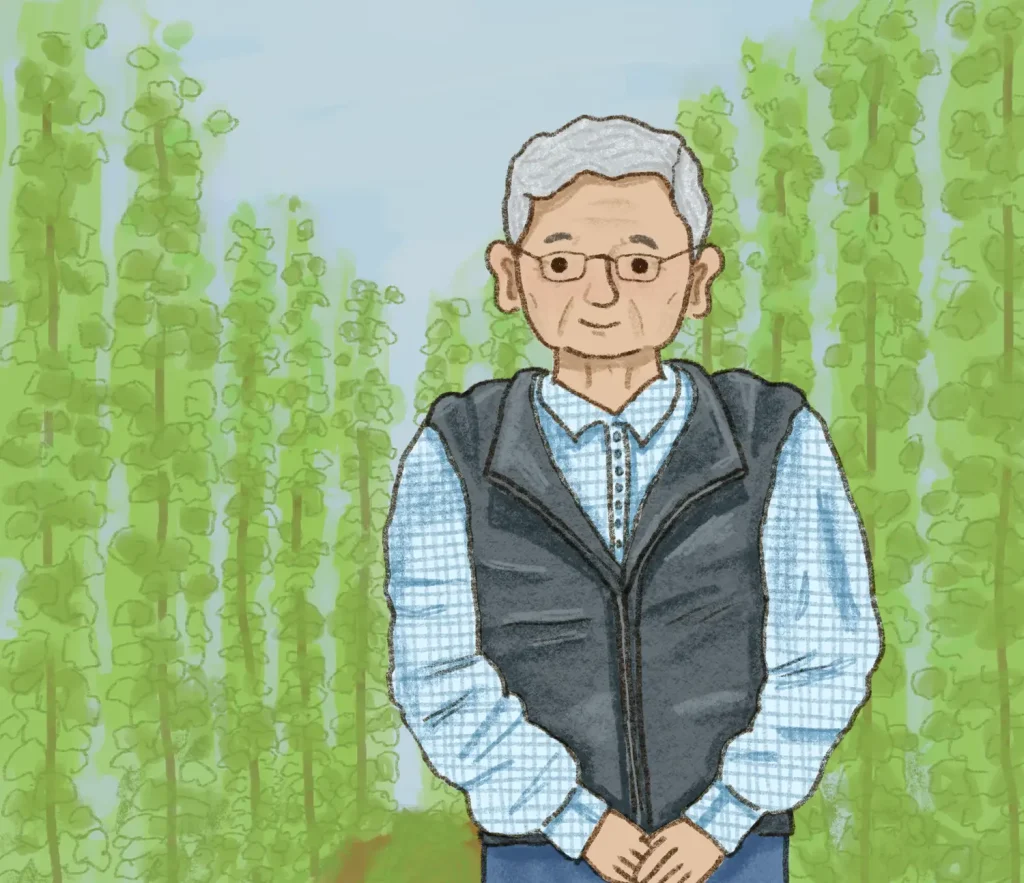
- The first [chapter] starts on Musqueam Reserve No. 2, where Grant stands on a bank of the stɑl’əw̓, the Fraser River, not too far away from UBC’s Point Grey campus. Grant spent most of his childhood growing up on the reserve, and still lives there today.
- Even though Grant didn’t attend UBC as a student until after he had retired from working the trades, he’s now an adjunct professor and the Elder-in-Residence at the First Nations House of Learning. However, he knew the campus long before he started teaching here.
- The Musqueam and Chinese communities became “intertwined” because “Indigenous people were denied integration within the surrounding community, and the Chinese were denied citizenship, denied access to a lot of land,” Grant says in Reconciling. Neither group could enter professions in fields like health care or law; Indigenous people couldn’t even access post-secondary education unless they were pursuing theology.
- At the time, the local Indian agent — one of several federal bureaucrats who tracked and controlled Indigenous people across Canada until the position’s elimination in the 1960s — wanted the Musqueam to adapt to “Canadian ways” by doing more farming instead of fishing or hunting, and the Chinese immigrants happened to have a background in farming. “So these two marginalized groups—one with a background in farming but no land, the other with land but no tradition or desire to farm it—found one another.”
- “When Larry talks about reconciliation, he uses the verb: reconciling, a process we’re all going through, Indigenous and settler, immigrant and Canadian-born. ‘I have been reconciling my whole life, with my inner self,’” writes Steedman [the co-author]. Grant is still living with the hurt and trauma of spending most of his life having his identity stripped away from him, then given back, then taken again. It’s taken a while for him to come to terms with who he is.
[CBC Docs] (Sep 30, 2025) The “good Canadian” myth vs. Indigenous realities

April 1, 2021: Dr. Kerrie Charnley
Why we capitalize the ‘I’ in Indigenous Why we capitalize the ‘I’ in Indigenous
https://fccs.ok.ubc.ca/2021/04/01/why-we-capitalize-the-i-in-indigenous/
Indigenous titles, such as “Elder”, should always be capitalized.
SFU Communications & Marketing Communicators Toolkit; Language & Grammar
[H/t Tyler]
(Sep. 25, 2025 ) To Get a High School Diploma, Indigenous Kids like Me Had to Leave Behind Everything They Knew
https://thewalrus.ca/susan-aglukark-memoir/
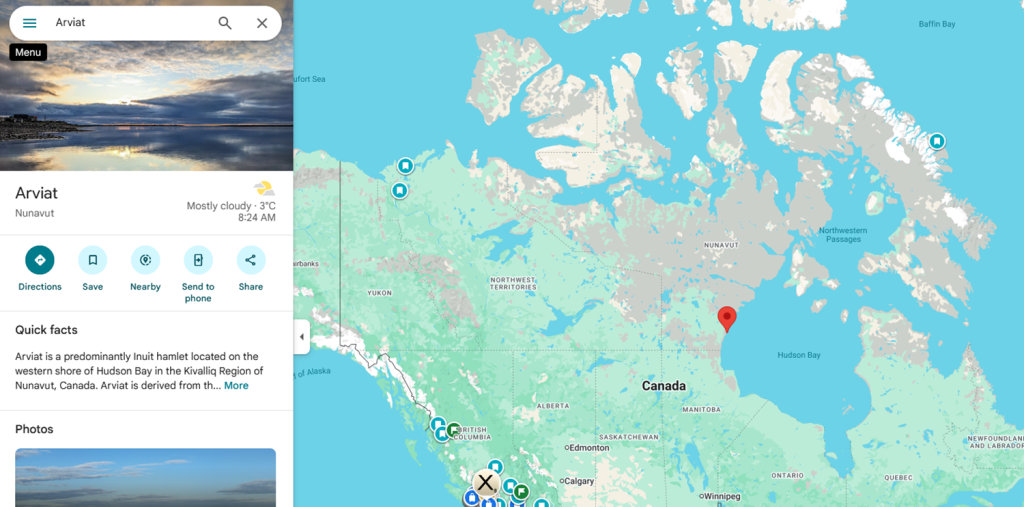
- Everything was so structured and ordered, but it was at odds with how I was feeling on the inside. I never felt truly clear about my role in that environment; I was just told to go here, do this.
- I felt disconnected from it all, never truly engaged. We were robots doing what we were told, and if we didn’t do what we were told, or if they caught us doing something we shouldn’t be doing, there were consequences.
- There was no high school where my family lived in Arviat, or in our region, the western shore of Hudson Bay, so kids had to go away for grades ten through twelve in order to get their high school diploma.
The semester of grade ten I had spent studying at Maranatha in Saskatchewan made me realize that maybe the way I felt—that there was something wrong with me and that was why I struggled—was not because there was actually something wrong with me but rather because there was something wrong with this system, the way things were set up for us but not by us. If it’s not me, then what is it?
- There were a few great teachers I loved, but it only took one or two or three to do some real damage.
- We always knew we were not the only Indigenous people of this country, but I hadn’t really been among others until Yellowknife. Yellowknife was the first time that I was on their territory. We have always known about territory. “This is not yours. You are a visitor here.”
- In the late 1980s and early ’90s, when we started questioning why we had to send children so far away to finish school, we finally started asking, “What supports do kids need? What supports do we need?” We started talking about it. My generation put an end to perpetuating the silence.
NCTR Bentwood Box
https://nctr.ca/exhibits/bentwood-box/
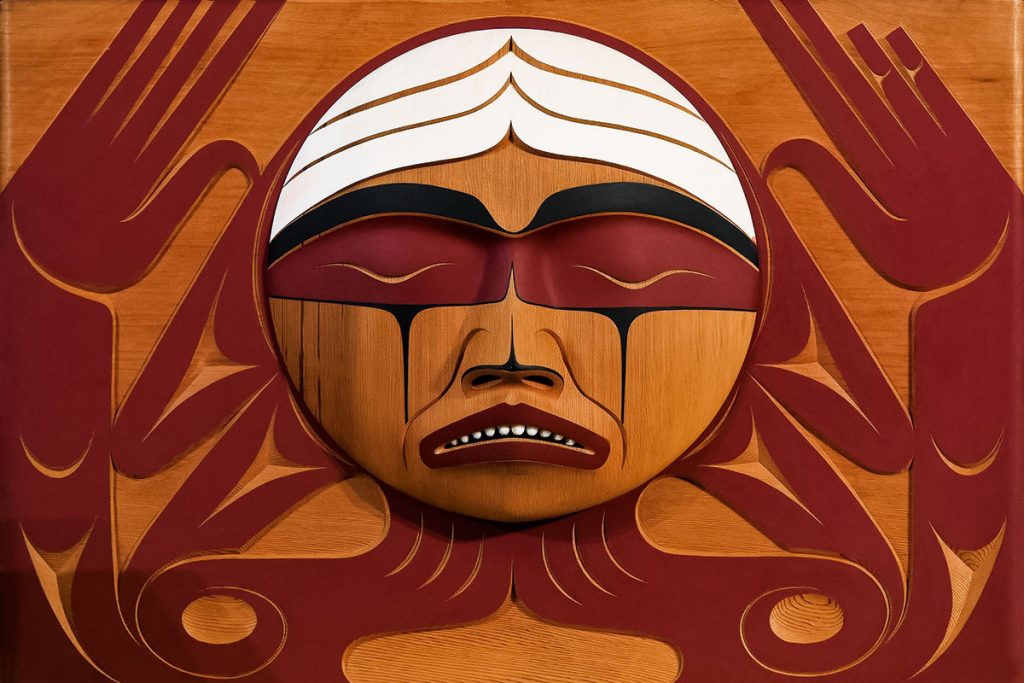
- Commissioned by the TRC in 2009, the Bentwood Box travelled with the TRC to its eight national events throughout Canada, where people placed personal items into the box to symbolize their journey toward healing and expressions of reconciliation.
- The Bentwood Box is a lasting tribute to all residential school Survivors. The sacred box and the items in this collection are deeply personal symbols of their experience.
- Bentwood boxes are traditional to the northwest coast with many uses…
- Coast Salish artist Luke Marston steamed, bent and carved the box in the traditional style from a single piece of sacred, old-growth red cedar. The artistic styles and imagery in its carved panels represent the distinct cultures of former First Nations, Inuit and Métis residential school students.
(Sept 15, 2025) Orange Shirt Graduation Ceremony to Honor First BC Grads
https://orangeshirtday.org/draft-post/

Today, the Orange Shirt Society announced a milestone for Truth and Reconciliation in Canada.
In April 2026, a graduation celebration at BC Place will honour the Class of 2026, the first cohort in B.C. to graduate having carried the truths of Orange Shirt Day and Residential School history from Kindergarten through Grade 12.
This historic gathering will bring together students, educators, leaders, and communities to celebrate the power of truth in education and the possibilities of reconciliation.
(Aug 8, 2025) Canada’s longest trial in history ends with devastating decision impacting Musqueam’s Aboriginal title and fishing rights Canada’s longest trial in history ends with devastating decision impacting Musqueam’s Aboriginal title and fishing rights
https://www.musqueam.bc.ca/news-release-08-08-25/
“Musqueam is extremely disappointed that Cowichan Tribes, Stz’uminus, Penelakut, Halalt and Lyackson would go against our shared Coast Salish protocols and challenge our traditional resource-sharing practices. It is especially concerning that they resorted to the colonial legal system, which was not established to respect or reflect our traditional teachings,” said yəχʷyaχʷələq, Chief Wayne Sparrow, Musqueam Indian Band.
(Aug 1, 2025) Where Christianity Meets, and Diverges, in Nisga’a Culture
https://thetyee.ca/Culture/2025/08/01/Christianity-Meets-Diverges-Nisgaa-Culture
There’s a longstanding, if uneasy, truce between Christian and Nisga’a traditions, rooted in colonialism, cultural preservation and almost a century of sustained missionary activity along K’alii-Aksim-Lisims, the river which unites the four Nisga’a villages.
- “Christianity is stuck — embedded — in our culture,” says Sampare, a recent high school graduate. “I think that the youth here aren’t as interested as they should be in our culture, but I don’t see them going to church either.”
ﻼF: My wife spent some time up North in Inuvik (Northwest Territories) and was surprised that all community gatherings began with a Christian prayer.
(June 27, 2025) Finding myself in blood, flesh, veins and bug bites — life at a hide camp for Two-Spirit Indigenous youth
https://thenarwhal.ca/two-spirit-indigenous-hide-camp/
It’s not just about softening a hide, it’s about softening into yourself. We share stories, speak our languages, put in our blood, sweat and the occasional tear, accidentally cut holes, sew up those holes and celebrate the small victories of each step. Hide tanning teaches us to slow down, listen and be in relation — reminding us that to return to the land, is to return to ourselves.
(June 23, 2025) Can You Be Sued for Saying Someone Isn’t Indigenous?
https://thewalrus.ca/can-you-be-sued-for-saying-someone-isnt-indigenous/
- On a fundraiser for Boivin’s legal costs—which has raised more than $28,000 since it was launched on May 9—her partner wrote in French that the lawsuit is “a fight to protect our knowledge, our identity, and to defend who we are as a people.”
- On her own fundraiser, Falardeau claims she is fighting for the right to self-identify as Metis: “I will defend the right to my identity,” she wrote in French. “I will defend my work, my books. I will defend my right to respect, security, freedom, and peace.”
- The Eastern Metis movement is widely decried by the Metis Nation and First Nations.
- “Had Dr. Coupal not self-identified as an Indigenous person, she would not have been hired as Canada research chair for truth and reconciliation education,” the hiring committee member testified.
(June 21, 2025) New signs are up!!
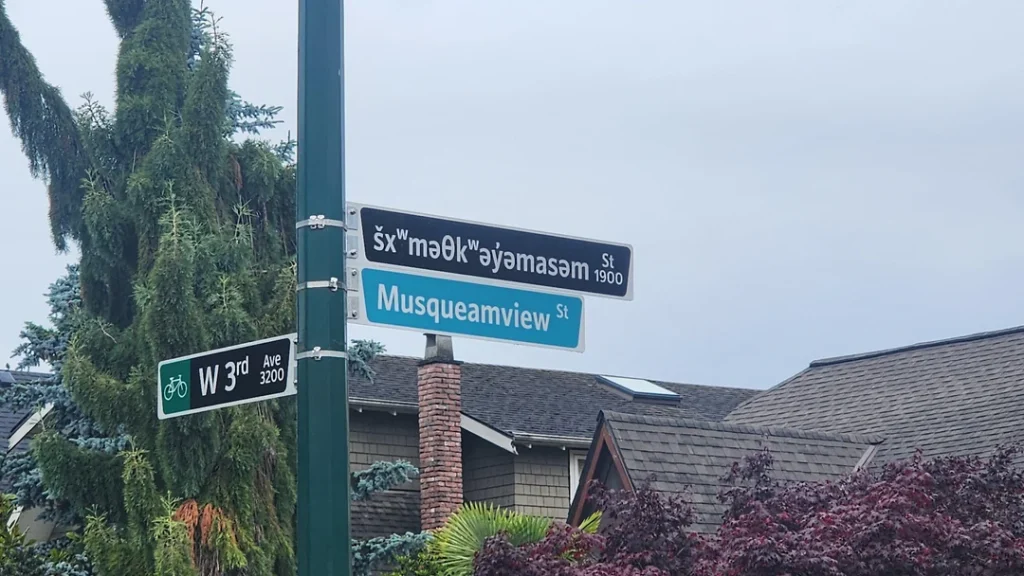
(June 16, 2025) Vancouver’s Trutch Street to officially be renamed following unanimous council vote
https://www.cbc.ca/news/canada/british-columbia/trutch-street-renaming-musqueamview-street-1.7562957
(June 18, 2025) Charles Menzies: Musqueam / UBC Relationship
https://menziesubcbog.substack.com/cp/166296445
- UBC sits on a large chunk of Musqueam’s unceded land. In fact (as pointed out by one of the Musqueam speakers), UBC sits on a chunk of land more than twice the size Musqueam’s own community holds as reserve land.

- The point to these meetings should be clear: an act of a First Nation’s authority and jurisdiction. Yet, outsiders continue to misunderstand them (willfully or through ignorance I am never certain).
UBC’s Point Grey Campus is located on the traditional, ancestral, and unceded territory of the xwməθkwəy̓ əm
(Musqueam) people. The land UBC is situated on has always been a place of learning for the Musqueam people who,
for millennia, have passed on their culture, history, and traditions from one generation to the next on this site.
(June 12, 2025) An Indigenous nation in Canada hails historic constitution: ‘We’re now the architects of certainty for ourselves’ [Bella Bella]
https://www.theguardian.com/world/2025/jun/12/canada-indigenous-heiltsuk-constitution
- For decades until 1973, staff at the Bella Bella hospital forcibly sterilized Heiltsuk men and women, who were classified as wards of the state under federal law.
- …like most nations in the province of British Columbia, the Heiltsuk never signed away their lands in treaties, nor did they surrender them in battle.
The constitution has been ratified at a time when Canada’s own sovereignty has come under pressure. Donald Trump has brazenly threatened to annex the country, and separatists in the Prairie provinces – motivated by long-held grievances towards eastern political elites – have angered Indigenous groups by ignoring the treaties that give legitimacy to the region that now wants to secede.
(June 11, 2025) Welcome to šxʷməθkʷəy̓əmasəm Street: Vancouver’s newest street name is also its first using alphabet other than English
https://vancouversun.com/news/sxʷməθkʷəy̓əmasəm-street-vancouvers-newest-street-name-trutch
- see September 30, 2022, below
- “In accordance with xʷməθkʷəy̓əm wishes, the legal name of the street will be solely šxʷməθkʷəy̓əmasəm Street, making this Vancouver’s first street named in hən̓q̓əmin̓əm̓,” the city report says.
- “With no fluent speakers left, this change is a landmark moment for the revitalization of the xʷməθkʷəy̓əm language, weaving the display of hən̓q̓əmin̓əm̓ into the public fabric of city life.”
(May 12, 2025) The Truth Behind Land Acknowledgements
Land or territorial acknowledgements have become a familiar ritual at universities, public events, and workplaces. Some see them as meaningful gestures of respect for Indigenous peoples, while others dismiss them as hollow and performative. But both views miss the deeper truth.
In this talk with Robert Jago, Indigenous Journalist and Writer in Residence, we’ll explore the origins of land acknowledgements in Coast Salish ancestral law — where they began as formal protocols with real-world responsibilities. We’ll examine how these practices were appropriated, stripped of their original meaning, and what it would take to restore their integrity and purpose.
“Land acknowledgments have been culturally appropriated by allies, in the name of meaning”
- Correct practice
- Identify yourself
- Explain your connection
- Declare your intentions
- Define the duration
- Don’t break your word
(Mayu 27, 2025) Read the full throne speech delivered by King Charles
https://www.cbc.ca/news/politics/full-throne-speech-1.754499
It is with a sense of deep pride and pleasure that my wife and I join you here today, as we witness Canadians coming together in a renewed sense of national pride, unity and hope.
I would like to acknowledge that we are gathered on the unceded territory of the Algonquin Anishinaabeg people. This land acknowledgement is a recognition of shared history as a nation. While continuing to deepen my own understanding, it is my great hope that in each of your communities, and collectively as a country, a path is found toward truth and reconciliation, in both word and deed.
(April 28, 2025) ‘I lost my legal right to vote’: Booths closed early — or didn’t open at all — in some Nunavik villages
https://www.cbc.ca/news/canada/north/planes-leave-nunavik-no-vote-1.7521042
- Lauzon, who’s normally based in Kuujjuaq, was motivated to vote when she saw an Indigenous candidate, a Cree woman, running in her riding of Abitibi–Baie-James–Nunavik–Eeyou. The riding has been held by the Bloc Québécois for two terms now.
- But when Lauzon turned up to the polls, she was told it was closing around 2:30 p.m. — seven hours before it was supposed to, as listed under the Canada Elections Act for districts in the Eastern time zone.
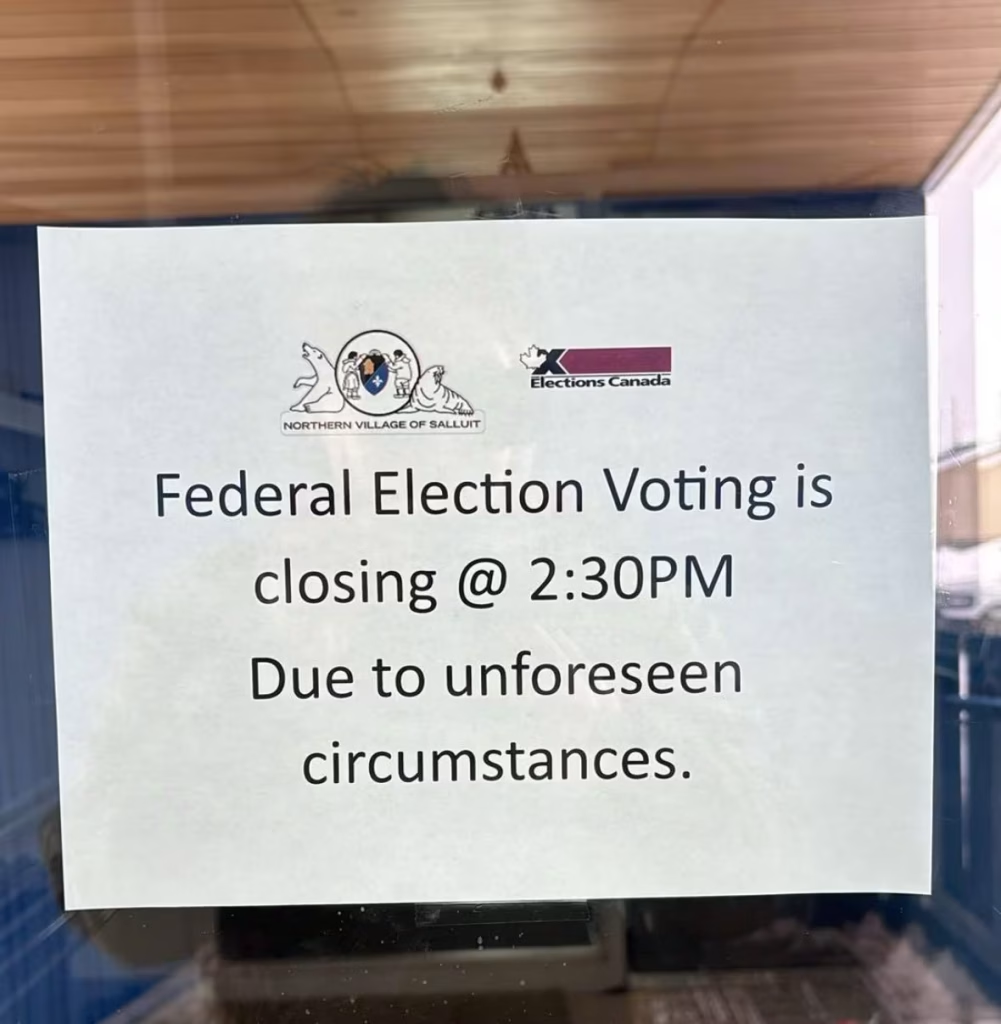
“Politics are taboo in Nunavik, especially for children. So maybe if we had a translator for these campaigns or if they’re broadcasted around Nunavik in Inuktitut, that we’d have more children or more adults who would want to be more involved,” Salluit’s Mary Papigatuk said.
(Mar 12, 2025) How AI images are ‘flattening’ Indigenous cultures – creating a new form of tech colonialism
https://theconversation.com/how-ai-images-are-flattening-indigenous-cultures-creating-a-new-form-of-tech-colonialism-246972
- h/t Tony Edwards
- The National Indigenous Times reports Adobe has come under fire for hosting AI-generated stock images that claim to depict “Indigenous Australians”, but don’t resemble Aboriginal and Torres Strait Islander peoples.
- Adobe’s stock platform was also found to host AI-generated “Aboriginal artwork”, raising concerns over whether genuine Indigenous artworks were used to train the software without artists’ consent.
Rocha, S. D. (2021). The syllabus as curriculum: A reconceptualist approach. Routledge. https://doi.org/10.4324/9780429027901
When we acknowledge that UBC is located on the “unceded, ancestral territory of the Musqueam people,” this reality of “unceded, ancestral territory” can be understood in more than one way. In the most immediate sense, this is a political statement of non-surrender. Concretely, this means that we are not gathered on the Crown Lands; there is no colonial sovereign in possession of this territory. But this can also, on my understanding, be understood as a spiritual statement of non-surrender. We are not gathered on soulless, inanimate ground; there is no modern scientific sovereignty over the metaphysical reality of this place. Unceded, ancestral territory, in this sense of spiritual resistance, is another way to say that the land is always-already sacred and it will never be surrendered to a worldview where nothing is sacred. The demand is not for tolerance or respect; sacred land demands reverence. We must know how to worship. (p. 144)
(Mar 5, 2025) Robert Jago; “so you’re about to be colonized”
➡ Jago is a member of the Kwantlen First Nation and Nooksack Indian Tribe [BP ref.]
- (Oct 10, 2023) Canada’s National Parks Are Colonial Crime Scenes
- “…throughout these years, continuing to this day, thefts have been occurring under the guise of ecological preservation—green colonialism.”
But the desire for the return of these lands goes beyond nostalgia. The places Canada has made into parks are filled with our stories—every mountain, every valley has a name and a history for Indigenous peoples. It is in these places that our history is alive: our Mecca is here, our Magna Carta, our Thermopylae.
(Feb 26, 2025) At the All Native Basketball Tournament, Stoking Friendship and Pride
https://thetyee.ca/News/2025/02/26/All-Native-Basketball-Tournament/
Mlieczko has a long connection with this event
- Archeological evidence has repeatedly upheld what the First Nations’ oral histories have always told: Indigenous occupation in this region goes back since time immemorial — longer than anyone can remember. A recent dig unearthed cultural evidence dating back 15,000 years. “That’s the oldest that’s ever been found in British Columbia,” Sterritt says.
(Feb 16, 2025) Ottawa ends funding for national advisory committee on unmarked residential school graves
https://www.cbc.ca/news/canada/north/funding-ends-for-national-advisory-committee-on-residential-school-missing-children-1.7460534
- The committee was formed after 200 potential burial sites were detected in 2021 through ground-penetrating radar at the former Kamloops Indian Residential School site, a finding that made headlines across the country and sparked international condemnation.
- In July 2022, Pope Francis came to Canada and apologized for the Catholic Church’s involvement in the schools.
- In 2015, the TRC determined that at least 3,200 children died while in federal custody at residential schools.
∞
Yesterday, I watched Sugarcane (2024) with Mlieczko.
- An investigation into abuse and missing children at an Indian residential school sparks a reckoning on the nearby Sugarcane Reserve [Williams Lake]
I told him about the Mother and Baby Homes Commission of Investigation:
- (Jun 25, 2023) A stain on Ireland’s conscience’: identification to begin of 796 bodies buried at children’s home
https://www.theguardian.com/world/2023/jun/25/a-stain-on-irelands-conscience-tuam-home-for-unmarried-mothers-gives-up-grimmest-of-buried-secrets
Animikii https://animikii.com/about
- Based out of Victoria
- Animikii means Thunderbird in Anishinaabemowin.
- Niiwin, an “Indigenous Sovereignty platform”
- CMS
(Feb 5, 2025) When Settlers Seized and Set Fire to the Kitsilano Reserve
https://thetyee.ca/Analysis/2025/02/05/Settlers-Seized-Set-Fire-Kitsilano-Reserve/
See the piece below about “settlers”
- In 1913, B.C.’s attorney general forced the original residents into an illegal sale of their land, sent them away on barges and burned the village of Sen̓áḵw to the ground.
Newspapers called it “exceedingly valuable property” while decrying it as a centre for crime and a “moral infection.” Its location, surrounded by the growing metropolis, made it a target of “settler attention, fear and desire,” writes Slobodian.
- “I grew up in the ’90s in Victoria and there was still this idea that Indigenous people live outside the city,” she said.
- Donald, D. T. (2009). Forts, Curriculum, and Indigenous Métissage: Imagining Decolonization of Aboriginal-Canadian Relations in Educational Contexts. First Nations Perspectives 2(1), 1-24.
- The editor of the Vancouver Daily World used the newspaper to actively campaign for the city to take it over for “civic breathing space.”
- Slobodian describes the Conservative position this way: “We’re going to have to break some laws, hurt some people, violate some rights.”
- ﻼF: US bully-In-chief’s recent comments on Gaza
∞
Hogan’s Alley
https://www.thecanadianencyclopedia.ca/en/article/hogans-alley
- Hogan’s Alley Society https://www.hogansalleysociety.org
- (Oct 21, 2024) The Real Hogan’s Alley, from two people who grew up in the once notorious area of Vancouver
https://vancouversun.com/news/the-real-hogans-alley-from-two-people-who-grew-up-in-the-once-notorious-area-of-vancouver
(Aug 30, 2021) Introducing yourself as a ‘settler’ creates division
https://www.cbc.ca/news/canada/saskatoon/calling-yourself-a-settler-pov-1.6151582
Revisiting this piece in Jan 2025; h/t Charles Menzies
It almost feels like a turning of the tables, whereby in calling yourself a settler in shame, am I the one who is to feel the white guilt? Are you trying to match some sort of intergenerational privilege to my intergenerational trauma? I don’t want to trauma bond over here.
Shawn Cuthand, a Cree/Mohawk comedian and podcaster living in Treaty 6 territory
(Jan 16, 2025) Revival of God Save the King in Dauphin-area schools raises concerns about reconciliation
https://www.cbc.ca/news/canada/manitoba/god-save-the-king-mountain-view-schools-1.7433745
- The Mountain View School Division, which oversees 16 schools near Dauphin, recently put forward a directive that the royal anthem must be included in announcements, along with O Canada and land acknowledgments.
- The notice goes on to say that all students would be invited to stand in a “respectful manner” but would not be forced to do so [source]

(November 23, 2024) Minister of Crown-Indigenous Relations delivers apology to Nunavik Inuit for Canada’s role in the killing of qimmiit (sled dogs)
https://www.canada.ca/en/crown-indigenous-relations-northern-affairs/news/2024/11/minister-of-crown-indigenous-relations-delivers-apology-to-nunavik-inuit-for-canadas-role-in-the-killing-of-qimmiit-sled-dogs.html
- The unjustified killing of qimmiit in Nunavik led to food and economic insecurity and the loss of traditional ways of accessing land, and caused deep and lasting emotional wounds to Nunavik Inuit that endure to this day.
(Nov 20, 2024) Standoff as Canada Yukon town council refuses to swear oath to King Charles
https://www.theguardian.com/world/2024/nov/20/canada-yukon-town-council-king-charles-oath
- The council of a town [Dawson City] in Canada’s Yukon territory has been locked for weeks in bureaucratic standstill after its members refused to swear a mandatory oath of allegiance to King Charles, citing the crown’s tarnished relations with Indigenous peoples in the region.
- In 2022, Quebec passed legislation ending elected officials’ required oath to King Charles. At the time, the provincial lawmaker Gabriel Nadeau-Dubois called it “a relic from the past”.
- But if an alternative cannot be reached by 10 December, a byelection is required and the mayor and councillors would forfeit their seats.
See (April 8, 2024) Under the Crown
https://kieranfor.de/2024/04/08/under-the-crown/
(Nov 17, 2024) Rewilding the self
https://kieranfor.de/2024/11/17/rewilding-the-self-draft/
(July 18, 2022) Pope describes Canada trip as ‘penitential pilgrimage‘
https://slmedia.org/blog/pope-describes-canada-trip-as-penitential-pilgrimage
- “And now I am about to embark on a penitential pilgrimage, which I hope, with God’s grace, will contribute to the journey of healing and reconciliation already undertaken,” the pope said.
(Oct 29, 2024) AI guru and Nobel winner Geoffrey Hinton donates half of prize money to clean-water charity for Indigenous peoples
https://www.theglobeandmail.com/business/article-ai-guru-and-nobel-winner-geoffrey-hinton-donates-half-of-prize-money
- donated [$350,000] of the monetary award to Water First, a Canadian charity that partners with Indigenous communities to address drinking water challenges.
- Prime Minister Justin Trudeau pledged to end long-term boil-water advisories on First Nations reserves within five years when first elected in 2015. There were 105 such advisories when he took office. Today, there are 32 advisories, according to Indigenous Services Canada.
Last week, I heard about the Salish Wool Dog
https://en.wikipedia.org/wiki/Salish_Wool_Dog [h/t, once again, to Mr. Caverly]
- The Salish Wool Dog, also known as the Comox dog or Clallam Indian Dog,is an extinct breed of white, long-haired, Spitz-type dog that was developed and bred by the Coast Salish peoples of what is now Washington state and British Columbia for textile production
- The small, long-haired wool dog and the coyote-like village dogs were deliberately maintained as separate populations. The dogs were kept in packs of about 12 to 20 animals, and fed primarily raw and cooked salmon. To keep the breed true to type and the preferred white color, Salish Wool Dogs were confined on islands and in gated caves.
I also learned about
Xwelítem Siyáya: Allyship and Reconciliation Buildingv
https://www.ufv.ca/peace-and-reconciliation/allyship-building-program/
- This program seeks to help build people’s capacity for reconciliation-building by teaching the importance of authentic allyship and providing skills for building relationships between colonial settlers and Indigenous communities here in the Fraser Valley and beyond.
(Sept 24, 2024) UBCIC Calls for Immediate, Concrete Action to Remove First Nations’ Barriers to Accessing Information
https://www.ubcic.bc.ca/ubcic_calls_for_immediate_concrete_action_to_remove_first_nations_barriers_to_accessing_information
- (xʷməθkʷəy̓əm (Musqueam), Sḵwx̱wú7mesh (Squamish) and səlilwətaɬ (Tsleil Waututh)/ Vancouver, B.C. – September 24, 2024) The Union of BC Indian Chiefs (UBCIC) calls on the federal government to take immediate and definitive steps to remove barriers for First Nations needing access to government-held records for the purpose of validating historical claims.
- [lots more detail therein]
(Sept 20, 2024) Health data collected from Indigenous Peoples in Canada has a dark history. One Indigenous company is turning that around
https://www.ctvnews.ca/health/health-data-collected-from-indigenous-peoples-in-canada-has-a-dark-history-one-indigenous-company-is-turning-that-around-1.7044920
- This week, at a ceremony in Victoria, the Canadian Medical Association (CMA) issued a formal apology for its role, and the role of the medical profession, in harms to Indigenous Peoples – including the unethical collection and misuse of health data that has contributed to ongoing mistrust of the health system and avoidance of care.
- Sommerfeld is the CEO of Mustimuhw Information, named for a Coast Salish word for “all of the people” or “all my relations.”
Owned and operated by Cowichan Tribes on Vancouver Island, the software company develops medical records systems that are built on a foundation of Indigenous traditions and values, allowing health providers working in First Nations communities to capture data informed by their cultural practices, ways of communicating and culturally guided care environments.
- But sharing health data effectively does not diminish the strength that comes from Indigenous people stewarding that data. Dr. Ryan Giroux, a Métis general pediatrician in Toronto, sees data sovereignty as “a natural extension of self-determination and self-governance.” This autonomy, he says, “shifts the power imbalance Indigenous people have felt within the health-care system.”
Making space for Indigenous data governance, he says, is a tangible step towards the decolonization of health care, for individuals as well as Indigenous communities as a whole.
- a framework for success based on four principles – the ownership, control, access and possession of information, or OCAP.
(Sept 29, 2024) Rustad wants B.C. Indigenous rights law repealed. Chief sees that as 40-year setback
https://bc.ctvnews.ca/rustad-wants-b-c-indigenous-rights-law-repealed-chief-sees-that-as-40-year-setback-1.7056306
- Rustad said in a statement on the Conservatives’ website last February, that the UN declaration, known as UNDRIP, was “established for conditions in other countries — not Canada.”
- [In 2019] Rustad threw his support behind the legislation as a member of the Official Opposition B.C. Liberal Party
Irish Symbols, for consideration: the harp and the shamrock

cf.
“Under the Crown” https://kieranfor.de/2024/04/08/under-the-crown/
William Bernard O’Donoghue
https://www.biographi.ca/en/bio/o_donoghue_william_bernard_10E.html
(Jan 7, 1998) Statement of Reconciliation: Learning from the Past [h/t to Robin for pointing to this]
https://nunatsiaq.com/stories/article/statement_of_reconciliation_learning_from_the_past/
- Indian Affair’s Minister Jane Stewart’s statement of reconciliation to Canada’s aboriginal people, delivered at a ceremony in Ottawa January 7, 1998
(Jan 7, 1998) Gathering Strength — Canada’s Aboriginal Action Plan
The Bottom line? We must work together to make life better for Aboriginal people.
(Sept 21, 2024) UBC Faculty of Education Homecoming 2024
- Went on the Indigenous Art Walk on campus. Lynne Tomlinson did a great job as guide and I learned some more about the Indigenous Art that is dispersed across campus.
- As a bonus, Larry Kuehn was also on the tour so I was able to connect with him and chat as we walked along the tour.
More:
- Potlatch Ban: From 1885 to 1951, the Indigenous ceremony known as the Potlatch was banned by the federal government of Canada {cultural genocide}.
- “…redistribution of wealth…”
- (April 16, 2021) ART WALK: Discover the self-guided outdoor art tour
- (April 2018) Self-Guided Tour: qeqən: Musqueam House Posts
- Raven Steals the Light to Mlieczko (c.f. Prometheus)
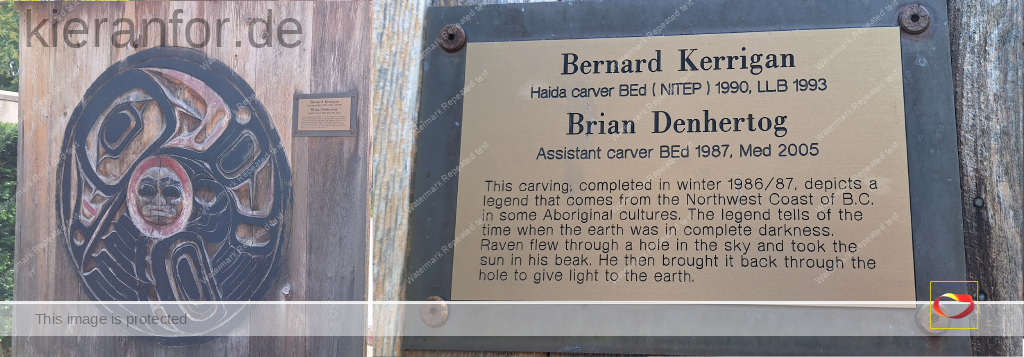
KF: house / totem / welcome
Sept 20, 2024: Saw this in the foyer of Alpha when I dropped Nicholle off at work
- (Nov 21, 2019) Burnaby school takes ‘reconciliaction‘ with Indigenous welcome carving
https://www.burnabynow.com/local-news/burnaby-school-takes-reconciliaction-with-indigenous-welcome-carving-3111495
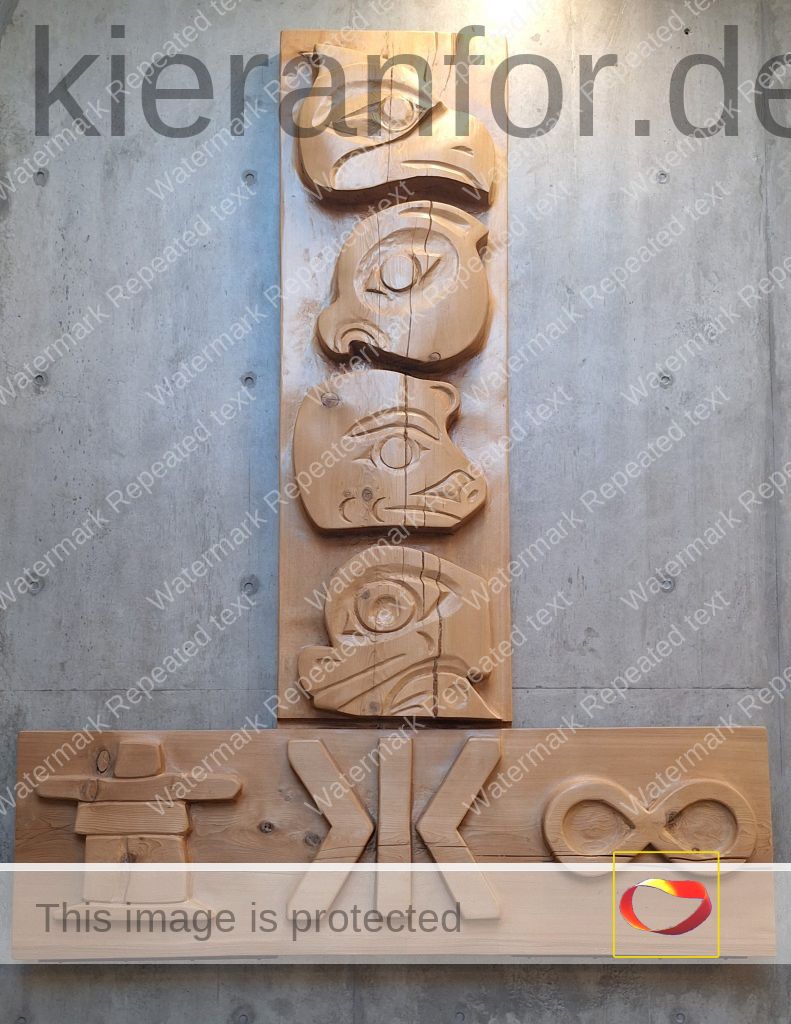
Thunderbird; owl; bear; frog
Inukshuk; butterfly?; Métis flag infinity loop / Möbius strip

Etuaptmumk ~ Two-Eyed Seeing [h/t to Robin]
www.integrativescience.ca/Principles/TwoEyedSeeing/
- Mi’kmaw Elder Albert Marshall in Fall 2004
to see from one eye with the strengths of Indigenous knowledges and ways of knowing, and from the other eye with the strengths of Western knowledges and ways of knowing … and learning to use both these eyes together, for the benefit of all.
“When you force people to abandon their ways of knowing, their ways of seeing the world, you literally destroy their spirit and once that spirit is destroyed it is very, very difficult to embrace anything – academically or through sports or through arts or through anything – because that person is never complete. But to create a complete picture of a person, their spirit, their physical being, their emotions, and their intellectual being … all have to be intact and work in a very harmonious way.”
Mi’kmaw Elder Albert Marshall

Jun 19, 2019) skʷit̕ᶿəc (Blackbird by the Beatles sung in hən̓q̓əmin̓əm̓)
I’d also like to share a video of a bunch of Irish kids singing in Irish; it makes me so happy to see this YouTube Channel and how happy and engaged the kids look.
To review…
Wilson, J., & Nelson-Moody, A. (2019). Looking back to the potlatch as a guide to truth, reconciliation, and transformative learning. New Directions for Teaching and Learning, 2019 (157), 43–57. https://doi.org/10.1002/tl.20329
Research is ‘me’ search and when we as teachers work with dehumanized human beings we use the symbolism of
g ́ax̌ in’ ́akv (home) to support positive, agentic self-concept as a waypoint for re-establishing their power to be whole, joyful, and innovative. We have come to know doing the work of transformative praxis requires teachers to incorporate the transformational learning equation when planning course outcomes: Validation + Inspiration = Transformation. Liberation curriculum starts by validating an individual’s humanity, purpose, and necessity in the world in relation to those around them.
(Aug 26, 2024) BC Illegally Collected Personal Info Tied to the Wet’suwet’en Conflict
https://thetyee.ca/News/2024/08/26/BC-Illegally-Collected-Personal-Info-Wetsuweten/
- B.C. says it violated its own privacy laws when it gathered personal information from Coastal GasLink about “various individuals” involved in a high-profile conflict over the controversial pipeline project.
B.C.’s Freedom of Information and Protection of Privacy Act states that personal information must be collected directly from the individual. While the act provides exceptions, the province did not suggest that any applied in this case.
- While the information was sensitive enough to prevent public disclosure, it was not sensitive enough to trigger legislation that requires the government to notify people affected by a privacy breach, a spokesperson for B.C.’s Ministry of Citizens’ Services wrote in an email to The Tyee.
- The province’s failure to notify people affected by the breach while also saying that the information is too sensitive to release is a “have your cake and eat it too” argument, says Matt Malone, an associate law professor at Thompson Rivers University whose research focuses on privacy and access to information.
- “The government’s actions can be perceived as prioritizing its own interests over the rights of individuals,” he said. “It strikes me as cynical and disingenuous by the government to be using privacy arguments in this way.”
- Malone said this breach was “unique” because privacy concerns usually focus on information leaks rather than improper collection.
(Aug 31, 2024) Choctaw Nation unveils ‘eternal’ sculpture dedicated to Ireland
https://www.rte.ie/news/ireland/2024/0831/1467661-choctaw-ireland-sculpture/
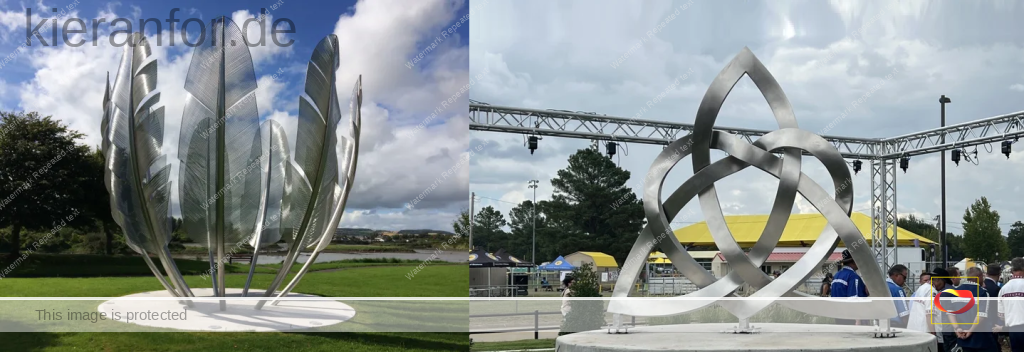
(June 18, 2017) Irish honor Choctaw Nation with “Kindred Spirits” sculpture
https://www.oklahoman.com/story/news/state/2017/06/18/irish-honor-choctaw-nation-with-kindred-spirits-sculpture/60592881007/
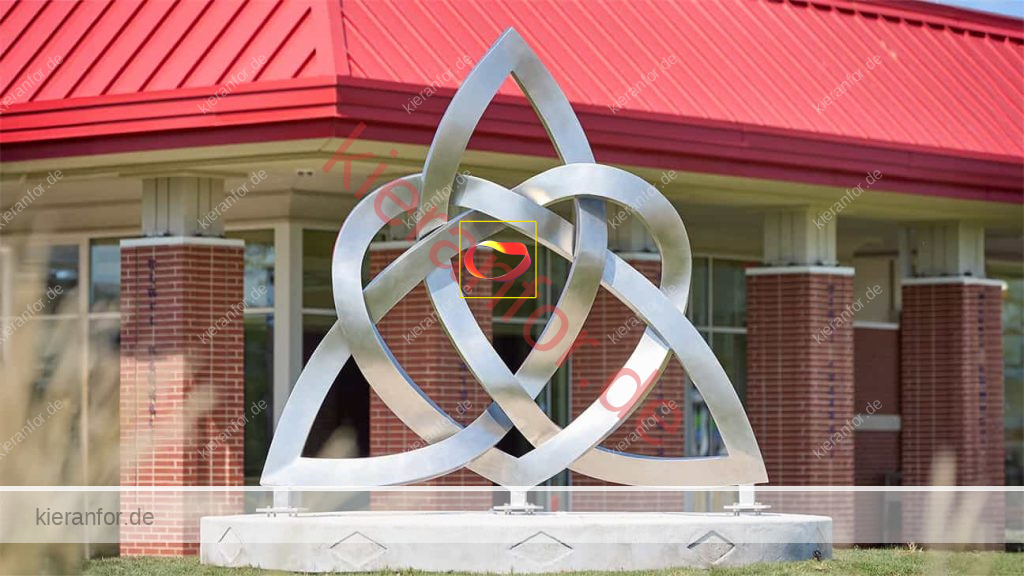
For more on this relationship, see:
Choctaw and Irish History
https://www.choctawnation.com/about/history/irish-connection/
(Aug 05, 2024) Terry Glavin: B.C. doesn’t need to atone for its origins
https://vancouversun.com/opinion/b-c-doesnt-need-to-atone-for-its-origins
There’s an extremely questionable narrative being pushed in this piece; I plan on discussing this with those who know more that I do about this history and coming back to comment on this.
In the meantime, it was interesting to learn:
- Victoria can still claim the second-oldest Chinatown in North America
- Congregation Emanu-El on Victoria’s Blanshard Street is the oldest continuously-occupied synagogue in Canada (1863)
- When Lumley Franklin was elected mayor of Victoria in 1865, he became the first Jewish mayor in North America.
- In 1871, the year B.C. joined Confederation, Victoria voters sent Wharf Street merchant Henry Nathan to Ottawa. He was Canada’s first Jewish member of Parliament.
For review:
- [Far from being about stealing Indigenous land, B.C. was established in order to protect Indigenous people from heavily-armed American marauders and to secure to the Indigenous people of the Fraser River all the rights of British subjects.] 🤔
- [Most of B.C. remains without benefit of treaty even now.]
(July 26, 2024) Canada owes First Nations billions after making ‘mockery’ of treaty deal, top court rules
https://www.theguardian.com/world/article/2024/jul/26/canada-payment-first-nations-indigenous-treaty-deal
- An “egregious” refusal by successive Canadian governments to honor a key treaty signed with Indigenous nations made a “mockery” of the deal and deprived generations of fair compensation for their resources, Canada’s top court has ruled.
(July 25, 2024) Can a lake become a person in law? A B.C. First Nation wants to find out
https://www.aptnnews.ca/national-news/can-a-lake-become-a-person-in-law-a-b-c-first-nation-wants-to-find-out/
- For the band, it became an opportunity to follow the lead of Indigenous Peoples in other countries who have successfully bestowed legal rights on nature to help stave off unwanted development.
- “We are at the very beginning stages of our work and the legal personhood is another legal tool in the colonial toolbox,” she said in a telephone interview with APTN News.
Louie, D. W. (2024). Barriers to Engaging with Reconciliation in Canadian Education: Confusing Colonial and Western Knowledge. Canadian Journal of Education Revue Canadienne De l’éducation, 47(2), 466–491. https://doi.org/10.53967/cje-rce.6325
- By first establishing accessible and shared definitions of reconciliation and colonization, common misconceptions and predictable pitfalls in Indigenous movements can be resolved. By attending to the confusion of terms the circle can be expanded ever so slightly to welcome more allies into the movement. Intentionally deceptive narratives position the work of reconciliation, or any social justice movement, as being anti-White and divisive.
In the pursuit of equity and healing, it is essential to maintain the core values of care and dignity in methods of emancipation and resist succumbing to colonial tactics of delegitimizing any knowledge system, even those of our oppressors…The aim of decolonizing projects is not to embody colonizing tactics and become the colonizer. \
- I want to emphasize that my scholarship is founded on anti-oppressive approaches and not diversity-based interventions.
- Ahmed (2006) contends that diversity-based approaches are often associated with ideas of equality, whereas anti-oppression requires interrogating our own collusion with systems and acts of oppression.
- St. Denis (2011) challenges multiculturalism by claiming it does not address racism in our society and that Indigenous people are not simply just one amongst a myriad of cultures in the Canadian context.
- ➡ 470
(June 28, 2024) Canadian woman gets three years’ jail in first ever sentencing for a ‘Pretendian’
https://www.theguardian.com/world/article/2024/jun/28/canadian-woman-sentenced-inuit-benefit-fraud
- A Canadian woman who fraudulently claimed her daughters were Inuit has been sentenced to three years in jail, in what is believed to be the first ever custodial sentence for a “Pretendian”.
- Karima Manji, whose daughters accessed more than C$150,000 in benefits intended for Inuit, was sentenced on Thursday, after pleading guilty to fraud in February.
(June 18, 2024) Indigenous data stewardship stands against extractivist AI
https://www.arts.ubc.ca/news/indigenous-data-stewardship-stands-against-extractivist-ai/ (via Tremonti)
Dr. David Gaertner, Associate Professor, Institute for Critical Indigenous Studies, and Associate Member of English Language and Literatures, argues how Indigenous practices of data stewardship, that for centuries have protected data sovereignty and cultural integrity, can help counter the settler desire for ‘AI magic’ that perpetuates harm and exploitation.
KF: wampum belts as coding
- (June 28, 2010) Lost Knowledge: Ropes and Knots
https://solar.lowtechmagazine.com/2010/06/lost-knowledge-ropes-and-knots/- Here, you can see rope/cord framed as hardware and knots framed as software. Seen this way, ropework is a form of coding where the knot(s) is programmed into the rope/cord to fulfill a specific output/outcome.
- From my (admittedly) basic understanding of Wampum (and as with a Qiupiu) a similar framing could be used to illustrate the technological advancement of pre-digital data storage and retrieval.
Watch: (Jan 14, 2015) Indigenous Knowledge and Western Science: Dr. Gregory Cajete Talk
NOTES
- not to “explain away”, but “finding ways to resonate”
- Axiology: the study of values and value judgements
- The two major subdivisions of axiology are aesthetics and ethics
- Epistemology: theory of knowledge; how you come to know what you know
- Logic
- Process
Native science is a metaphor for Native knowledge. Is it the stories of the world that include creative ways for living and participating in relationship with the world through processes for “seeking, life, relationship, and meaning.
11:59 Therefore, becoming open to the natural world with all one’s senses, body, mind, and spirit is the goal of Native Science.
- Resonance is the goal; Resonating self with self; self with community; with natural world; with the cosmos
- CF Pinar’s “attunement”
13:15 The metaphoric mind or “nature” mind has been evolving in human beings for over three million years with its greatest evolution occurring 70k years ago in the Paleolithic era
- Native science works with the rational and the metaphoric mind simultaneously. Its process is tied to creativity, perception, image, physical sensing, and intuition
Trumpish 🤣@16:59
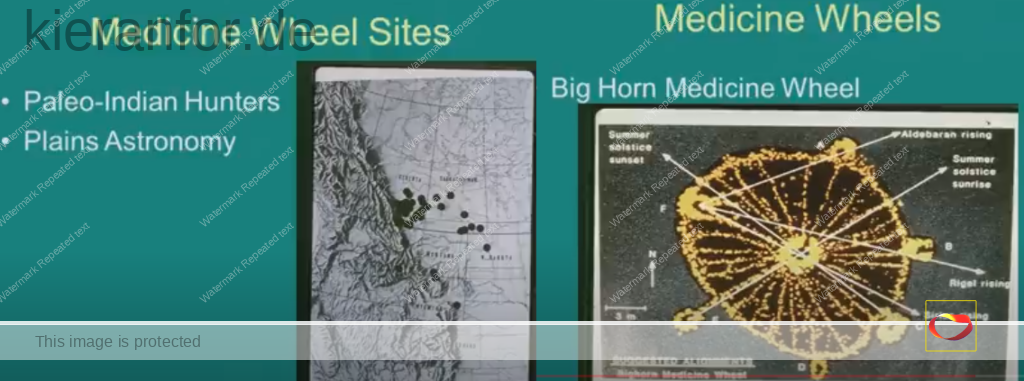
- (23:15) Orientation: Semi-Cardinal Directions
- 24:45 Solstices and equinox cf. Newgrange
(June 3, 2024) The violent criminals who suddenly identify as Indigenous once in prison
https://nationalpost.com/opinion/robert-jago-the-violent-criminals-who-suddenly-identify-as-indigenous-once-in-prison
- When I put this problem to the Deputy Commissioner for Indigenous Corrections back in February, they replied that they refused to verify claims to Indigenous identity on general principle, saying: “Self-identification is based on an offender’s expression of their identity … As with any other designated group member (persons who self-identify as being of a visible minority group or a person with a disability), there is no expectation of proof. If an inmate identifies as Indigenous, he or she is considered Indigenous. CSC does not monitor or verify this information.”
∞
(July 16, 2009) Josiah Wilson, the Indian Act, hereditary governance and blood quantum?
https://www.cbc.ca/news/indigenous/josiah-wilson-indian-act-hereditary-governance-1.3668636
- Josiah Wilson, was born in Haiti, and adopted by Don Wilson, from Heiltsuk First Nation.
- Josiah says he is Heiltsuk because, ‘I have a native dad, I have a status card and I’ve been accepted by the community.’
- What, or who, defines someone as Indigenous — is it the hereditary system, the Indian Act, a blood test?
- Lots of overlap here in my thinking on Self-identification: On Irishness
(2024) Trutch Street ➡ šxʷməθkʷəy̓əmasəm (Musqueamview xʷməθkʷəy̓əm)
- We were at Musqueam [xʷməθkʷəy̓əm] on Sept 30, 2022 for the renaming ceremony.
(May 28, 2024) Ontario First Nation legislator makes history at Queen’s Park
https://www.cbc.ca/news/canada/toronto/mpp-sol-mamakwa-oji-cree-ontario-legislature-1.7216763
- Ontario’s legislature had not previously allowed interpreting and transcribing a language other than English and French.
- The legislature brought in interpreters to translate Mamakwa’s words in real time. Mamakwa’s words will also be represented in syllabics, an Indigenous writing system, in Hansard, the official record of proceedings at Queen’s Park.
(May 28, 2024: Charles Menzies) ‘On Stolen Land’ – ‘Occupation is a Crime’
https://menziesubcbog.substack.com/p/on-stolen-land-occupation-is-a-crime
- Settler colonialism – a process with population replacement as the primary goal
- [The term] obscures the social differentiation among so-called settlers
- In isolation ‘settler’ implies or denotes a purposefulness on the part of the settler that may not, in fact, exist. Political and economic refugees may have no choice but to flee. Indentured and enslaved ‘Settler’s’ were robbed of their agency to choose. Even those who ostensibly chose to immigrate may have done so under conditions that left little effective choice. Many waves of settlement were, in fact, the outcome of people forced to flee turmoil, war, and prejudice in a homeland that may well have ejected them. In this context, the act of settling is less a purpose and more an outcome. Yet the analytic framing of ‘settler colonialism’ assumes settlement as the driving purpose.
- Those who were instrumental in setting the colonial agenda, those already in possession of capital and prestige in their homelands, might more aptly be called ‘settlers’, as they both had the choice and the means to make good on their choices. These are the people, the social class, who benefit from displacement and resettlement of people.
(May 16, 2024) The Ontological Resonance of Doctrine of Discovery in Education with Dr. Shannon Leddy
The Canadian Museum for Human Rights asks, of The Doctrine of Discovery:
- How might rescinding the Doctrine affect the government’s relationship with Indigenous peoples?
- What old colonial ideas and racist stereotypes continue to influence us in Canada today?
- Where and how did you learn about the history of colonization in Canada?
Shannon spoke of papal bulls, documents that “provided religious authority for Christian empires to invade and subjugate non‐Christian lands, peoples and sovereign nations, impose Christianity on these populations, and claim their resources. These papal bulls were written at a time when European empires were embarking on widescale colonial expansion.” (source)
- In 1155, Pope Adrian IV, the only Englishman to have served in that office, issued the bull Laudabiliter that purports to grant the right to the Angevin King Henry II of England to invade and govern Ireland “to reveal the truth of the Christian faith to peoples still untaught and barbarous, and to root out the weeds of vice from the Lord’s field.”
- These bulls were not use only to “Christianize”: Christians of the “wrong sort” were subject to the same sort of bull where an ideology was fabricated to justify colonization, subjugation, and domination: this Dominion remains in many places, both in the ongoing geo-political sense, but also in the settler-colonial legacy of intergenerational trauma and cultural genocide.
- Kent Monkman, The Scream, 2017 and Kent Monkman, Iron Horse, 2015 both make me think of John Gast, American Progress, 1872 and the beginning of Schooling the World (2010)
Revisiting the land-bridge theory
(Jan 09, 2018: Angela Sterritt) B.C. Indigenous people react to the resurfacing of 2 migration theories https://www.cbc.ca/news/canada/british-columbia/bc-indigenous-communities-react-to-the-resurfacing-of-two-migration-theories-1.4479632
- Bering Strait theory: Migration across a land bridge spanning the Bering Strait from Siberia to Alaska
- The Solutrean hypothesis: people from Europe may have been among the earliest settlers of the Americas.
- Oscar Dennis…a Tahltan language conservationist…thinks the journey from Asia took place — but with watercraft rather than on foot. Dennis even asserts that origin stories are illustrations of the journey.
- Haida elder Woodrow Morrison believes migration was possible, but that people would have gone both ways through various corridors and land masses throughout the world.
- But some elders dispute that migration happened at all.
McGhee, R. (1989). Who Owns Prehistory? The Bering Land Bridge Dilemma. Canadian Journal of Archaeology / Journal Canadien d’Archéologie, 13, 13–20. http://www.jstor.org/stable/41102821
- THE USES OF ARCHAEOLOGY
- Archaeology as “a handmaiden of colonialism
- THE BERING STRAIT DILEMMA
- The Asiatic origin of New World peoples is a theory which is as close to dogma as scientific archaeology allows. It is a theory, however, which is forcefully and almost unanimously rejected by native
- …such an interpretation of their past implies that they are “just another group of immigrants” to this country, and diminishes their claim to a distinct and valuable cultural
- WHO OWNS PREHISTORY?
- A Canadian museum director who recently visited New Zealand reports that prehistoric archaeology in that country has practically ceased because of Maori opposition
- “The Māori lived in New Zealand for over 300 years before European settlers arrived”
- It is argued that archaeological theories regarding the Indian past deprive theological beliefs, resulting in a lack of pride in the value of their cultural heritage, and contributing to a cultural malaise which leads directly to economic and social problems
- [The danger of] “proprietary history”, in which a single group or organization can exclude all others from researching or interpreting an historical topic.
- A Canadian museum director who recently visited New Zealand reports that prehistoric archaeology in that country has practically ceased because of Maori opposition
- SHARING THE PAST
- (in Canadian law, as in the British law from which it derives, the “dawn of legal memory” is defined as the year A.D. 1168)
- (in Canadian law, as in the British law from which it derives, the “dawn of legal memory” is defined as the year A.D. 1168)
(May 5, 2024) A B.C. First Nation’s 3-year effort to change a city’s name
https://www.todayinbc.com/news/a-bc-first-nations-3-year-effort-to-change-a-citys-name-7353966
- Powell River is named after Israel Wood Powell. Born in Ontario in 1836, he was appointed as the superintendent of B.C.’s newly formed Department of Indian Affairs in 1872.
- For the next 17 years, he pursued “policies aimed at assimilating Indigenous peoples into settler Canadian society,”
- It’s now been three years since Tla’amin Nation’s efforts first began, and there’s not much to show for it in a way of tangible change
(May 2, 2024: Charles Menzies) First Nations people and campus ceremonies https://charlesmenzies.substack.com/p/first-nations-people-and-campus-ceremonies
- …complexities to affirming cultural practices when such practices might be at odds with each other.
- Smudging, the ceremonial burning of a plant and then bathing in the smoke, is not Indigenous to coastal BC
- At the same time the effects of colonialism has dispersed and shifted our communities…ceremonies like smudging, that originated away from the coast, have come here and have for many First Nations people become an important aspect of one’s spirituality and cultural practice.
UBC has had a mixed approach to the ceremony of smudging. When I was first hired at UBC (in the mid 1990s) I heard of issues with campus security interrupting smudging ceremonies. Colleagues for whom this was an important issue worked hard to get a protocol in place that would permit indoor smudging. For many years a sort of cultural detente persisted. This seems to have changed.
- It would appear that while there is indeed no university level policy, some kind of draft statement/guideline/policy has been working it’s way through the system. At the opperational levels of the university this ‘policy’ is being applied as though it is a rule.
(April 30, 2024) How Workplace Diversity Fails Indigenous Employees [Michelle Cyca]
https://thewalrus.ca/how-workplace-diversity-fails-indigenous-employees/
- CIBC uses Our Children’s Medicine to “Indigenize the employment processes”
- “Our Children’s Medicine was founded by Josh Hellyer (the grandson of former defence minister Paul Hellyer), once a TV and film producer, a self-published author, and a mental health advocate. Hellyer is not Indigenous, but his Instagram bio reads ‘Indigenous ally.'”
- “decolonization” and “Indigenization”: The two terms are often used interchangeably, though, in short, the former refers to removing colonial influences from a system while the latter refers to incorporating Indigenous elements into a system
Even prisons, where the proportion of Indigenous inmates has risen by 32 percent in the past decade, have gotten on board with Indigenization: in December, without any apparent irony, the Canadian government congratulated itself on a correctional facility for Indigenous inmates constructed in the shape of a soaring eagle.
For context, see https://www.canada.ca/en/public-services-procurement/corporate/stories/indigenous-programs.html

- 2015 – Truth and Reconciliation Commission – 94 Calls to Action
- …how Indigenization is seen as a service that can be subcontracted out with minimal oversight or attention. The resulting efforts are tokenizing, clumsy, and shallow.
- the transformation demanded by the TRC has been usurped by generic, symbolic expressions of solidarity that treat hundreds of nations and peoples across the country as a monolith.
- There have been exceptions: in 2017, Vancouver International Airport signed a thirty-year agreement with the Musqueam Indian Band, which includes revenue sharing, employment, and educational opportunities and protections for environmental and archeological resources.
“What tends to happen is that reconciliation becomes exploitation,” says the Yellowhead Institute report’s co-author Eva Jewell, “where Indigenous peoples are expected to either fix the institutions they’re working in, or orient themselves to the powers that be and reconcile with the Canadian state. So we’re asked to fit into the box of the institution, and then once we’re included, the institution [feels it has become] diverse and equal.
(April 19, 2024) I learned about the UBC Former Youth in Care program last week and followed that link to the link below.
(March 29, 2019) ‘No act of reconciliation is too small,’ says B.C. advanced education minister https://www.clearwatertimes.com/news/no-act-of-reconciliation-is-too-small-says-b-c-advanced-education-minister-5712493
- … post-secondary tuition fees were waived as part of a provincial program launched in 2017. The program requires B.C.’s 25 public post-secondary schools to offer free schooling to students aged 19 to 26 who spent at least two years in care.
- Growing up in care makes it difficult, for many reasons, to access post-secondary education. These children move often and only one-third of them graduate high school with a Dogwood diploma by the time they turn 19.
- For Indigenous children, the situation is worse. Even if they aren’t in care, they’re less likely to graduate than non-aboriginal kids — 69.6 per cent compared with 86.5 per cent — and if they are in care, they’re less likely to access post-care income support as an adult.
- The majority of children in care in B.C. are Indigenous — 63.5 per cent — even though Indigenous people make up just four per cent of the provincial population.
“When you look at the impact of residential schools and the intergenerational impact when kids were taken out of their families, the communities are still recovering. …[E]ducation was unfortunately the method that was used to destroy the culture and break down those families, but it’s also going to be the way to lift them back up”
William Litchfield, associate vice-president, university relations, at VIU
- B.C.’s Minister of Advanced Education Melanie Mark is Indigenous and she grew up in government care, living in two foster homes and later in the care of a relative. She is B.C.’s first female First Nations MLA and cabinet minister.
- VIU — with nearly 100 students on tuition waivers — has more Indigenous students than any other university in B.C.
(Jun 26, 2023) B.C. university [KPU] waives tuition for students from local First Nations. Will other schools follow? https://www.timescolonist.com/bc-news/bc-university-waives-tuition-for-students-from-local-first-nations-will-other-schools-follow-7194240
(Mar 14, 2023) B.C. lifts age limit on free tuition for those who were once in care
https://www.cbc.ca/news/canada/british-columbia/free-tuition-age-limit-1.6778680
As a result of the above: (May 2, 2024) Melanie Mark: Provincial Tuition Waiver Program
https://kieranfor.de/2024/05/02/melanie-mark/
(Apr 14, 2024) ‘We were born knowing this is ours’: B.C. signs deal recognizing Haida Nation title over Haida Gwaii
https://www.cbc.ca/news/canada/british-columbia/b-c-haida-gwaii-title-agreement-1.7173601
- The province says the “Rising Tide” title agreement is a “first-of-its-kind” deal negotiated between the NDP government and the nation, shifting “ownership and jurisdiction of land from the Crown to the Haida Nation in Crown law.”
(April 7, 2024) I joined the board of the BC Freedom of Information Association last December. It’s a great organisation; if you haven’t already, please check them out.
I’m just out of our annual Board retreat where, among many other things, I learned of the Tsawwassen First Nation Freedom of Information and Privacy Act (2009/2017) which aims to
to provide Tsawwassen Members and other “qualifying persons” with access to information in the custody and control of a Tsawwassen Institution (defined as Tsawwassen Government, and any body, board or commission it may establish); and to mandate the protection of personal information that is collected by a Tsawwassen Institution.
FINAL_Summary_Freedom_of_Information_and_Protection_of_Privacy_Act_2013.10.21.pdf (tsawwassenfirstnation.com)
I’m connecting the above to my interest in privacy and identity, as well as my ongoing learning within education; In this case, I think specifically of the First Peoples Principles of Learning and how these might inform practices of data collection, retention, storage, destruction, and use: the issue of the Nation’s consent being key.
Vanner, C. et al (2024). Teaching about Missing and Murdered Indigenous Women, Girls, and 2SLGBTQQIA+ People: Implications for Canadian Educators. Canadian Journal of Education. https://doi.org/10.53967/cje-rce.5883
RQ: How can teachers enhance the critical consciousness of Canadian young people about MMIWG2S?
- showcasing the experiences of eight teachers already teaching about MMIWG2S, the recommendations of 11 adolescent Indigenous girl activists [Treaty 6 Métis], and the guidance provided in the Their Voices Will Guide Us teaching and learning guide, published alongside the National Inquiry’s final report
Indigenous women and girls are 12 times more likely to go missing or be murdered than other women in Canada.
- Following the Truth and Reconciliation Commission (TRC)’s report on residential schools in Canada, education about residential schools expanded substantially to hold a central position in many provincial curricula
- The National Inquiry’s report has not garnered the same attention in education.
- Participant self-identified as “Muslim” for ethnicity cf. White, Métis, European & North African
- The National Inquiry classifies this violence as genocide [KF cf. “acts of genocide“] because of its linkages to centuries of colonial policies that targeted Indigenous women, girls, and 2SLGBTQQIA+ people, culminating in their dehumanization and dramatically higher exposure to violence
- Clark (2016) calls for violence to be understood within a complex web of social forces, emphasizing the resistance and resilience of Indigenous women, girls, and 2SLGBTQQIA+ people so that their stories are not only of victimhood [more on this]
- calls for “desire-centred research,” which centres on “the hope, the visions, the wisdom of lived lives and communities. Desire is involved with the not yet and, at times, the not anymore”

- Battiste’s (2013) concept of decolonizing education
- School systems have to disrupt settler innocence narratives by showing Canada as “a settler colonial state where Indigenous peoples continue to face systemic discrimination”
- the importance of educators’ critical self-reflection on their positionality and implication in the issues they are teaching about before they can support their students to do the same.
Tuck and Yang’s (2012) critique of settler educators who falsely claim to be decolonizing education classifies this practice as a settler move to innocence, defined as “strategies or positionings that attempt to relieve the settler of feelings of guilt or responsibility without giving up land or power or privilege”
I would absolutely expect non-Indigenous educators to acknowledge their privilege, to learn about colonial history, to not have White guilt about it, to work through that because it’s not about you. It’s about how can we give an explanation so young people can feel that their lives are empowered and they can be proud that they are Indigenous youth.
Marie, the only Indigenous (Michif) teacher participant
(Mar 28, 2024) Ontario moves to allow use of Indigenous languages in legislature https://www.theguardian.com/world/2024/mar/28/ontario-indigenous-languages-legislature-canada
- moved to amend a standing order that previously required lawmakers to use either English or French. Following a vote, that order now allows for an “Indigenous language spoken in Canada” to be used when addressing the speaker or chamber.
- Sol Mamakwa, a member of the New Democratic party who represents the Kiiwetinoong electoral district, recalled being punished for speaking Ojibwe (Anishinaabemowin) in his youth.
- (Sep 14, 2022) Indigenous MPP Sol Mamakwa declines to participate in oath to King Charles III https://toronto.citynews.ca/2022/09/14/indigenous-mpp-sol-mamakwa-king-charles-oath/
(Mar 21, 2024) Two men swapped at birth – one Indigenous, one white – finally get apology
https://www.theguardian.com/world/2024/mar/21/richard-beauvais-eddy-ambrose-switched-birth-responsibility-apology
- Richard Beauvais, 68, believed he was Indigenous. Eddy Ambrose, who shares the same birthday, always understood that he was of Ukrainian descent
- The painful saga, which embodies the damaging effects of Canada’s colonial policies, also highlights the fragile nature of identity and the complex meaning of family.
- The case marks the third known such mistake in the province of Manitoba.
(Mar 17, 2024) Toronto researchers help uncover Ontario First Nations’ donations to Irish Famine relief fund https://www.cbc.ca/news/canada/toronto/ontario-first-nations-irish-famine-donations-1.7143918

- In the summer of 1847, Toronto gave refuge to 38,000 Irish famine victims — at a time when Toronto’s population was only 20,000.
- The part of this history that is virtually unknown is the contribution to the relief fund from Indigenous communities in Canada.
“At least 15 bands answered the call and requested that donations be deducted from their government annuities, added to the fund, and then sent to ‘our suffering fellow subjects and Christian brethren in Ireland and Scotland,” according to Mark McGowan’s research. McGowan is a professor of history at the University of Toronto and has spent time going through the archival documents.
- McGowan says the documents show Mohawks, Haudenosaunee of the Six Nations, Chippewa, Delaware, Wyandotte, and Mississauga peoples had donated £115, an amount equivalent to $12,426 today.
- With further donations from the Saugeen, Ojibwa of Lake Huron, and Moravian Ojibwa, the total Indigenous gift to the relief fund was £165, or $17,978 in today’s Canadian currency. Some of these contributions came from Indigenous communities in Quebec.
(Mar 12, 2024) Indigenous language program sees bright future in permanent home
https://www.cbc.ca/news/canada/british-columbia/squamish-nation-language-kitsilano-schoolhouse-1.7142031
- Immersive program for babies and toddlers an example of reconciliation, parent says
- The Henry Hudson building in Vancouver’s Kitsilano neighbourhood was set to be demolished by the Vancouver School Board to make way for a new elementary school, until the Squamish Nation saved it in the eleventh hour.
- After a journey across the Burrard Inlet on a barge in August, the schoolhouse was renovated, with education for little ones in mind
(December 8, 2023) Louis Riel Act receives Royal Assent, becomes law
https://www.mmf.mb.ca/news/louis-riel-act-receives-royal-assent-becomes-law
- Louis Riel finally recognized as the first Premier of Manitoba.
➡ see Stones/Balancing: Jock Langlois (Red River Metis)
https://indigenizinglearning.educ.ubc.ca/stones-balancing/
(September 30, 2022) Musqueam gifts new name to City of Vancouver to replace Trutch Street
https://www.musqueam.bc.ca/renaming-ceremony-vancouver-trutch-street/
- Nicholle and I were on this Musqueam Indian Reserve on the National Day for Truth and Reconciliation for this renaming ceremony.
- Musqueamview
- AFAIK, the signposts for Trutch street have still not been changed (Mar 2024)

╬
(Mar 17, 2017) Should non-Indigenous Canadians learn Indigenous languages? (CBC)
- It’s complicated, but one thing is for sure: don’t be this guy:
- (Jan 30, 2024) Powell River City Councillor (Jim Palm) Mocks Tla’amin Language with Made-Up Place Name
https://www.tlaaminnation.com/powell-river-city-councillor-mocks-tlaamin-language-with-made-up-place-name/
- (Jan 30, 2024) Powell River City Councillor (Jim Palm) Mocks Tla’amin Language with Made-Up Place Name
See: UBC First Nations and Endangered Languages Program https://fnel.arts.ubc.ca
╬
(Dec 16, 2016) ‘Who is Jimmy Gwich?’: the story behind my radio sign-off [Duncan McCue]
https://www.cbc.ca/radio/checkup/blog/who-is-jimmy-gwich-the-story-behind-my-radio-sign-off-1.3901020
- In Anishinaabemowin, “miigwech” means “thank you.”
- Adding “chi” makes it literally “big thank you.
Canada’s Indigenous roots are also reflected in hundreds of place names, such as Kamloops (from the Shuswap “Tk’emlups,” meaning “where the rivers meet”), Manitoba (from the Cree “manito-wapâw” meaning “the strait of the spirit”), or Canada itself (from the word meaning “village” or “settlement” in St. Lawrence Iroquoian tongue).
https://www.cbc.ca/radio/checkup/blog/who-is-jimmy-gwich-the-story-behind-my-radio-sign-off-1.3901020
[34] years since Elijah Harper said ‘no’ to the Meech Lake Accord
https://www.cbc.ca/news/canada/manitoba/25-years-since-elijah-harper-said-no-to-the-meech-lake-accord-1.3110439
- Learned about this from Brian Ennis at BCIT (Mar 2024)

Indigenous Storywork
HANDS BACK … HANDS FORWARD https://indigenousstorywork.com/elders-teachings/
- …teaching of the late Dr. Vincent Stogan, Tsimilano, our dear Elder from Musqueam. Tsimilano taught us that Hands back… Hands forward guides us to reach back and learn from those that have gone before us, and then reach forward to pass on the teachings to those that are coming after us.
➡ @Alex: this is the Irish storyteller I mentioned: Eddie Lenihan. I saw him in action once, sitting by the fire in an old pub, the lights dimmed, the crowd hushed. It was magical.
(Aug 8, 2022) What is a land acknowledgement?
https://students.ubc.ca/ubclife/what-land-acknowledgement
Updated August 2024, in prep for new academic year.
𝐖𝐞 𝐚𝐫𝐞 𝐠𝐚𝐭𝐡𝐞𝐫𝐞𝐝 𝐭𝐨𝐝𝐚𝐲 𝐨𝐧 𝐭𝐡𝐞 𝗨𝗕𝗖 𝗣𝗼𝗶𝗻𝘁 𝗚𝗿𝗲𝘆 𝗰𝗮𝗺𝗽𝘂𝘀 𝗼𝗻 𝘁𝗵𝗲 𝘂𝗻𝗰𝗲𝗱𝗲𝗱, 𝗮𝗻𝗰𝗲𝘀𝘁𝗿𝗮𝗹, 𝗮𝗻𝗱 𝗼𝗰𝗰𝘂𝗽𝗶𝗲𝗱 𝘁𝗿𝗮𝗱𝗶𝘁𝗶𝗼𝗻𝗮𝗹 𝗹𝗮𝗻𝗱𝘀 𝗼𝗳 𝘁𝗵𝗲 𝗠𝘂𝘀𝗾𝘂𝗲𝗮𝗺 𝗽𝗲𝗼𝗽𝗹𝗲. I am an uninvited guest on this land. I am originally from the West of Ireland. My people’s history is one involving the occupation of our land and the loss of our native language and important parts of our culture. I became a Canadian Citizen in December 2023 meaning that I now have a responsibility to make myself more aware of the story of this land and the peoples that have lived and learned on/from it for millennia. Over the coming months, I invite you to share some of your learning with me so that we can better understand how to show our respect and honour our connection to this land and to those who have long held it in responsible stewardship.

